Bus strategy progress ‘too slow, too piecemeal’
Greater support and more consistent funding is needed to deliver vision of the Bus Back Better strategy, Transport Committee tells government
Two years on from the launch of the National Bus Strategy for England, MPs on the Commons Transport Committee have expressed concerns about the pace of delivery. They have urged the government to maintain its focus and provide greater support.
A new report, Implementation of the National Bus Strategy, published by the committee last week, calls for more consistent funding to achieve the government’s goal of having 4,000 new zero-emission buses by 2024, which “seems increasingly unlikely to be met”. And whilst a transition to zero emission buses is essential, “efforts to encourage people out of their
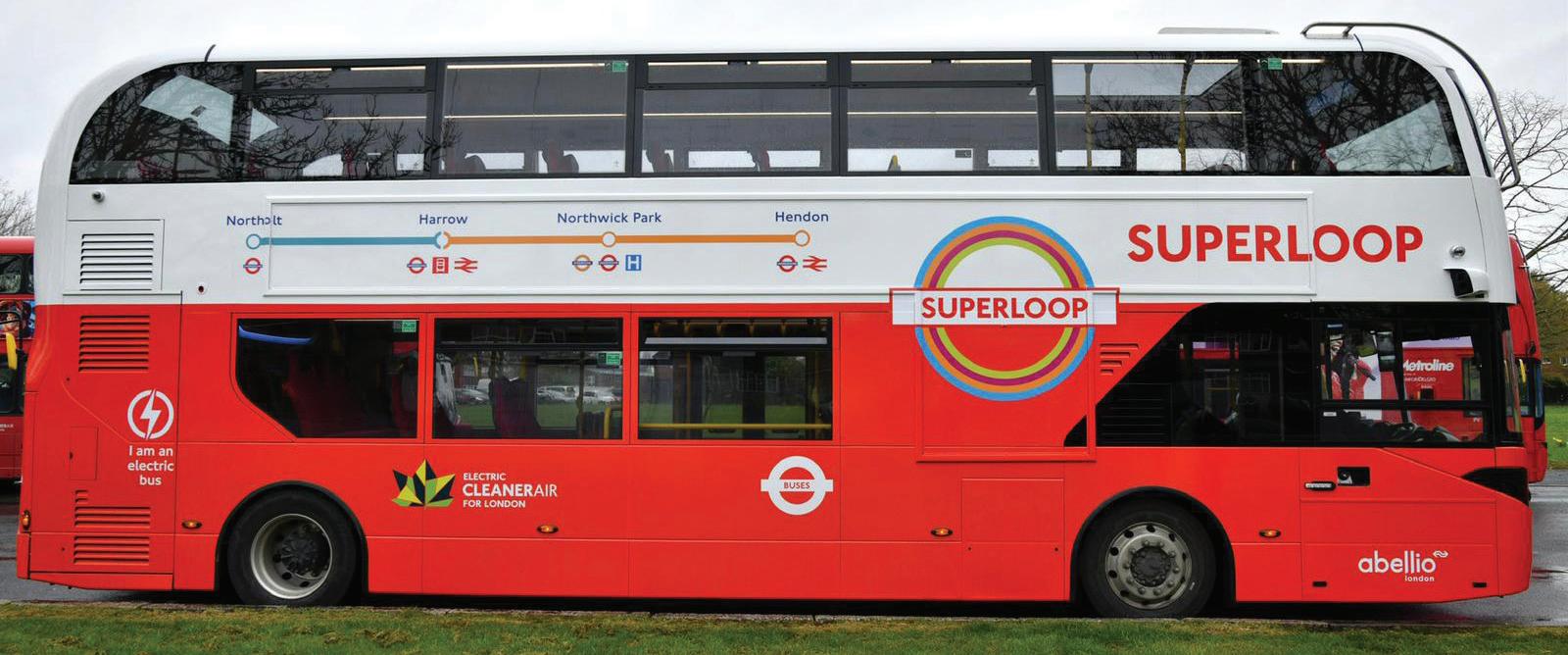
cars by making bus services more reliable should also be prioritised to help cut carbon emissions”.
The committee also called for reform of the Bus Service Operators Grant so that operators “aren’t incentivised to stick to diesel vehicles”, and new guidance on how local authorities can support socially necessary services.
“The government’s 2021 National Bus Strategy recognised
that something had to be done,” said committee chair Iain Stewart. “We warmly welcomed its ambition and invention, as did many others in the sector.
“But our report finds that, while many of the strategy’s ideas were on the right track, progress in implementing them has sometimes been too slow, and in some cases, too piecemeal. There have been some successes, such as the recently announced Bus Centre of Excellence, but not all local areas in England have received sufficient funding to realise their ambitions and make a real difference.”
MORE ON PAGE 04
NEWS ISSUE 286 7 APRIL 2023 NEWS, VIEWS AND ANALYSIS FOR A SECTOR ON THE MOVE
“Not all local areas ... have received sufficient funding”
Iain Stewart MP
Impact of £2 bus fare cap revealed Transport Focus finds modal shift evidence 13 Bee Network ‘will transform Manchester’ Transport chief on bus franchising plans 06 A weak response to net zero needs
Baker on decarbonisation plan 18 Who wants to go to Old Oak Common?
Warner on cutting back HS2 20 North Wales capping launch
unites 25 local bus companies 17 NEWS COMMENT INNOVATION & TECH
Norman
Alex
Scheme
COMMENT FORTEVERY
SADIQ’S SUPERLOOP London mayor Sadiq Khan has announced plans for a network of limited-stop express bus routes that circle the capital, serving outer London town centres, hospitals and transport hubs. Full story on page 9
NIGHT
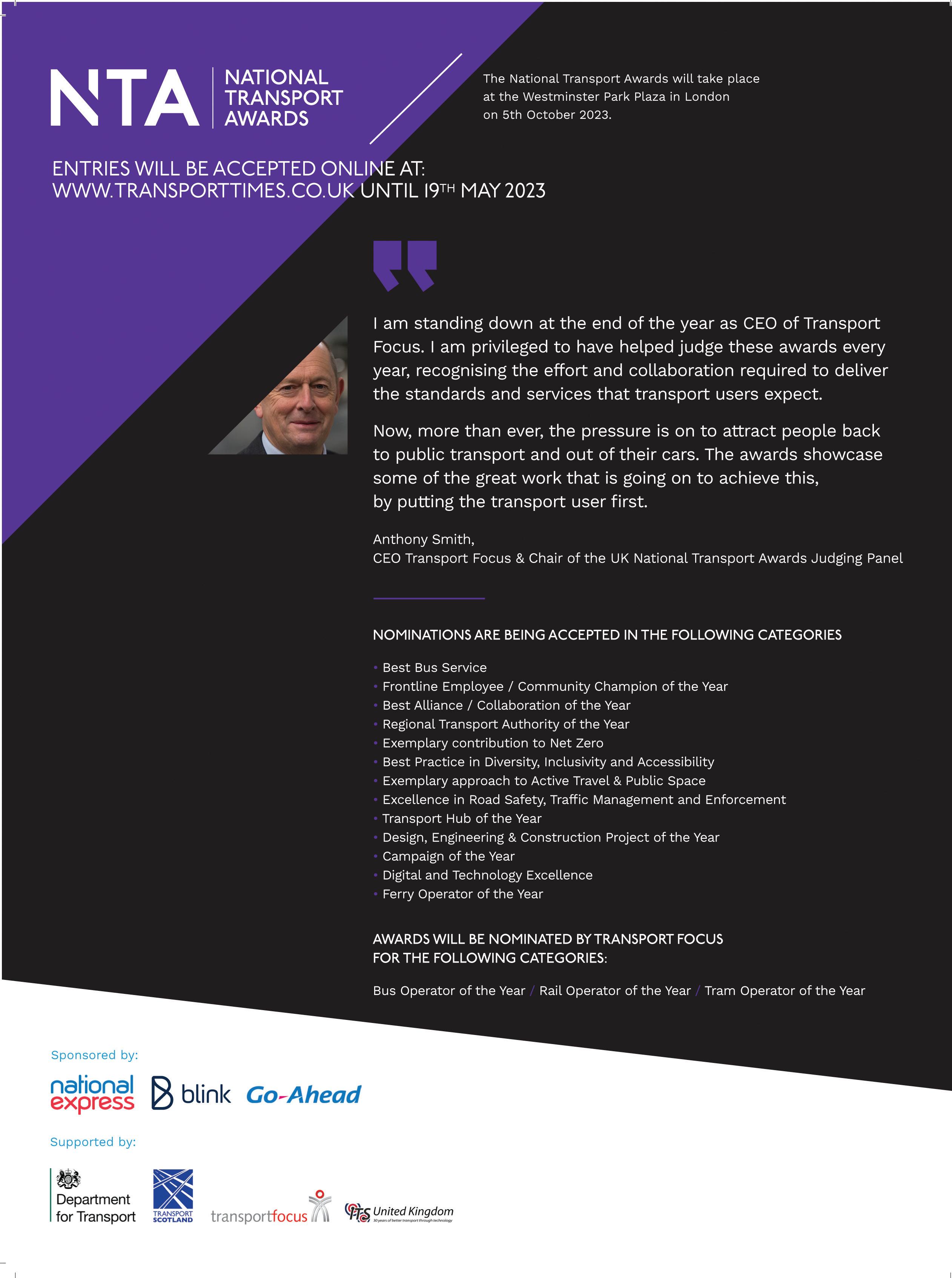
Has the time come for minimum bus service levels?
IN THIS ISSUE
08 R AIL USERS ANGRY AT T FW RAIL DISRUPTION
Transport forWales has launched two new train fleets,but there were rare moments of joy amid a rolling stock crisis,with most Class 175 units out of use and many lines having shortened trains, cancellations or no trains at all.
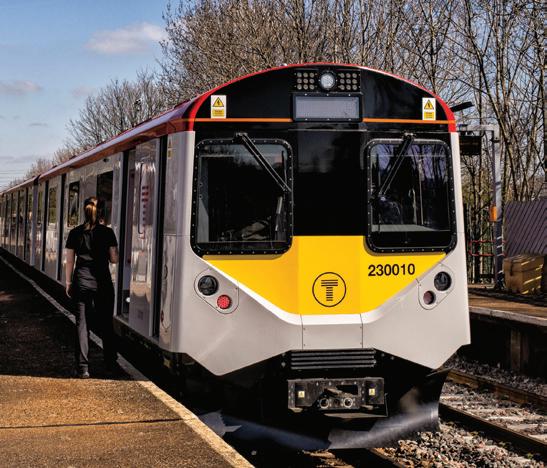
22 P OLICY STATEMENT IS SHORT ON POLICY
Robert Jack Managing Editor
I can’t remember exactly when it was but it must have been around 20 years ago. Sir Moir Lockhead, the chief executive and co-founder of FirstGroup, was responding to a question at CPT Scotland’s annual conference about more funding for buses. His response can be summarised as “we don’t want it because it will come with strings attached”, and it was a view that would have been shared by many of his peers.
How times have changed. The two decades that followed saw a decline in bus use that was aggravated by the pandemic. So perhaps it’s not surprising that the programme for CPT’s inaugural UK Bus & Coach Conference in Birmingham last week featured a session on minimum service levels - ‘How much bus is enough?’. We heard Gideon Salutin from the Social Market Foundation speak about efforts to come up with a metric to measure transport poverty in the same way we do for fuel poverty. Meanwhile, Brad Taylor of the Campaign to Protect Rural England warned about places becoming ‘transport deserts’ and the ‘Every Village, Every Hour’ proposal. CPT is right to start this conversation. The current CPT president, Ralph Roberts of McGill’s, believes that we should think of bus services in terms of need instead of demand. Why should we have minimum service levels for rail and other public services, but not buses? The money to provide these minimum services levels may come with strings attached - but those strings could also be lifelines.
PASSENGER TRANSPORT editorial@passengertransport.co.uk
forename.surname@ passengertransport.co.uk
Telephone: 020 3950 8000
Managing
EDITORIAL
ADVERTISING ads@passengertransport.co.uk
SUBSCRIPTIONS subs@passengertransport.co.uk ACCOUNTS
The UKGovernment has published a draft National Policy Statement on the future for national networks but it lacks meaningful substance in many areas,says Nick Richardson “All in all it’s pretty awful guidance from the government,”headds.
24
S OLAR HAS A FUTURE THAT IS VERY... BRIGHT!
Despite the hurdles,it’s difficult to see a world where solar power does not play a huge part in our energy solutions going forward,says James Spencer.Emission free,zero cost generation and cheaper than wind turbines,solar power is on the march.

25
DO N’T BLAME US FOR STALLING BUS PROGRESS
Great Minster Grumbles: OurWhitehall insider imagines what’s going on inside the minds of the mandarins at Great Minster House,home of the DfT. TheTransport Select Committee has taken the Department to task for failing to deliver on the bus strategy.
REGULARS
Andrew Garnett
Editor & Publisher Robert Jack Deputy Editor
Rhodri Clark
Cheek,
CONTACT DETAILS Passenger Transport Publishing Ltd PO Box 5496, Westbury BA13 9BX, UNITED KINGDOM Telephone (all enquiries): 020 3950 8000
Contributing Writer
Directors Chris
Andrew Garnett, Robert Jack OFFICE
editorial@passengertransport.co.uk
accounts@passengertransport.co.uk Passenger Transport is only available by subscription. Subscription rates per year; UK £140 (despatch by Royal Mail post); Worldwide (airmail) £280 The editor welcomes written contributions and photographs, which should be sent to the above address. All rights reserved. No part of this publication may be reproduced in whole or in part without the publisher’s written permission. Printed by Cambrian Printers Ltd, Stephens & George Print Group, Goat Mill Road, Dowlaid, Merthyr Tydfil CF48 3TD © Passenger Transport Publishing Ltd 2023 ISSN 2046-3278 SUBSCRIPTIONS HOTLINE 020 3950 8000 PASSENGER TRANSPORT PO Box 5496, Westbury BA13 9BX 020 3950 8000 editorial@passengertransport.co.uk CONTENTS www.passengertransport.co.uk 7 April 2023 | 03 ORGANISATION PAGE ALBUM 14 Alexander Dennis 13 Bee Network 6,7 Bluestar 14 Brighton & Hove 13 Bus Users UK 17 Campaign for BetterTransport 4-5 Carousel Buses 13 CPT(UK) 4-5,11,16 CubicTransportation Systems 16 Diamond Bus 7 Docklands Light Railway 9 Elizabeth Line 9 Equipmake 16 First Bus 14 GMCA 6,7 Go-Ahead Group 13 Go South Coast 14 Guide Dogs 14 HS2 Ltd 12 London Overground 6 LondonTrams 16 Metrobus 13 NationalAudit Office 12 National Infrastructure Commission12 Network Rail 4-5,11 Oxford Bus Company 13 Oxford SmartZone 13 Stadler 12 Stagecoach South 14 Stephensons of Essex 14 Ticketer 17 Transport Focus 6,12 Transport for Greater Manchester 6,7 Transport for London 1,9,11 Transport forWales Rail 8,12 UrbanTransport Group 10,13 Vivarail 8
NEWS 04 NET ZERO 16 INNOVATION & TECH 17 COMMENT 18 GRUMBLES 25 CAREERS 26 DIVERSIONS 28 HAVE YOUR SAY Contact us with your news, views and opinion at: editorial@passengertransport.co.uk
Concerns raised over bus strategy progress
Transport Committee urges government to maintain focus on bus strategy, while campaigners warn one in five bus services were lost since its launch
It was more than two years ago that the National Bus Strategy for England was launched. It set out a vision for achieving the “substantial and untapped potential” of buses. It was championed by then prime minister Boris Johnson, who said: “As we build back from the pandemic, better buses will be one of our major acts of levelling-up.”
The intervening period has seen two changes of prime minister, and although the government remains committed to the strategy, an increasing number of voices are beginning to express concern about the pace of delivery.

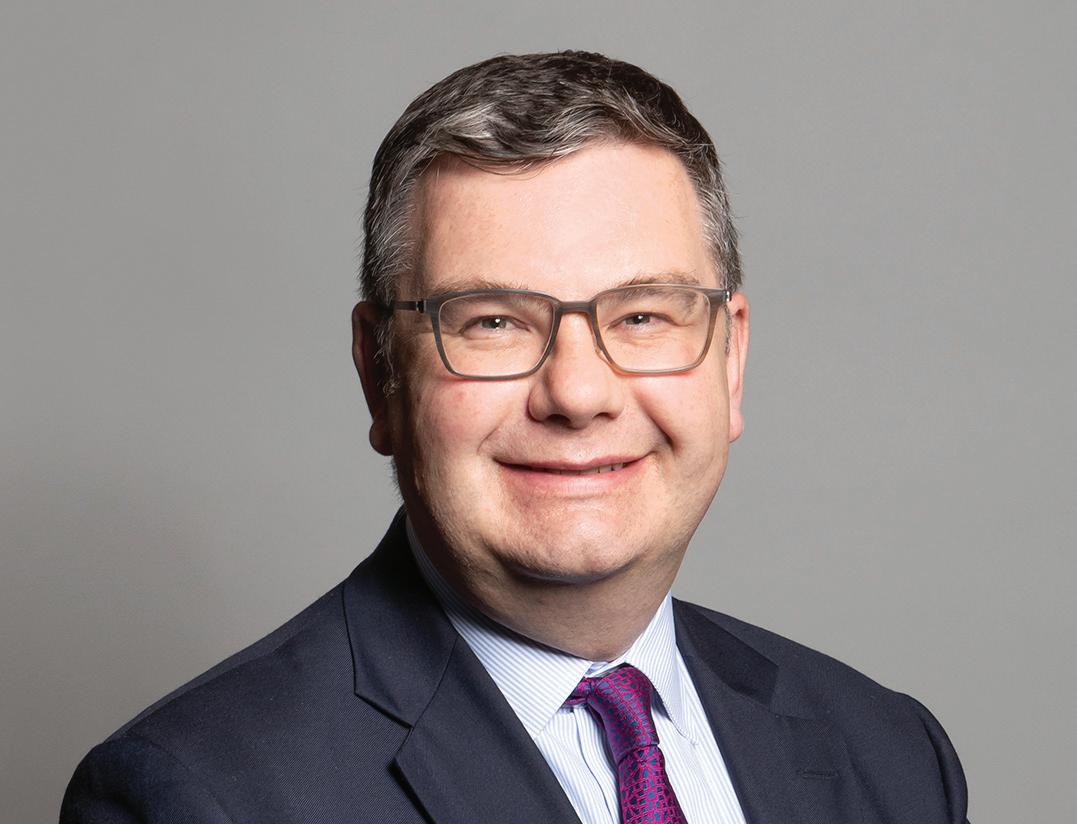
Some aspects of bus provision have gone backwards. Local bus services have been in decline for a number of years, but Campaign for Better Transport research has revealed that between March 2021, when Bus Back Better was launched, and March 2023, more than one in five (23%) bus services in England have been cut, resulting in 2,800 fewer services.
Published last week, the Commons Transport Committee’s new report, Implementation of the National Bus Strategy, argues that while the strategy was ambitious, full of good ideas and supported by extra, funding, progress “has sometimes been too slow, and in some cases, too piecemeal”.
The loss of passengers that
resulted from the pandemic made the National Bus Strategy vision so much more difficult to achieve, forcing the government to find billions of pounds of additional funding just to stand still. This situation was summarised by Network Rail chair Sir Peter Hendy at last week’s CPT UK Bus & Coach Conference in Birmingham, who observed: “The sunny uplands of the National Bus Strategy had to be replaced by government support, and that was provided very willingly.”
However, following publication of the Transport Committee’s report, committee chair Iain Stewart said: “It would be absurd
to have spent billions supporting the ailing bus sector through the pandemic, and then see services decline. The £2 fare scheme was a great innovation, but ministers must continue to support the sector as it builds a new network fit for the post-pandemic world.”
Provide more funding
Under the National Bus Strategy, local authorities were required to work with operators to develop a Bus Service Improvement Plan (BSIP). Councils were invited to bid for funding to support BSIPs from a £1.1bn pot of Department for Transport funding. However, the Campaign for Better
Transport found that only 40% of bids were successful, and no local authority received the full amount that it bid for.
Whilst there were “success stories with great examples of innovation and collaboration between councils and bus firms”, the committee heard complaints that the £1.1bn allocated was not enough, and pitted local authorities against one another.
One unsuccessful council said this risked creating a “two-tier system” where services vary wildly in quality across county borders. Others called the application process “chaotic” and complained about how long it took the DfT to process bids. There were complaints that smaller councils with fewer resources were outgunned, and that the winning areas tended to have denser, more urban populations.
The committee is recommending that the government commit further funding to enable more local authorities to develop and follow through on their BSIPs.
“Allowing roughly half the country to miss out risks entrenching or even creating two-tier systems in which services improve in one area but worsen, or even disappear, in the next county,” the Transport Committee stated. “Without further rounds of funding this ‘national’ strategy will barely scratch the surface. It is also crucial that DfT gives assistance to [local authorities] that lost out so they can win next time.”
The committee also expressed disappointment that the DfT has not fulfilled a previous promise to publish guidance on how councils can support ‘economically or socially necessary routes’.
Zero-emission buses
Four-fifths of Britain’s bus fleet ran on diesel as of April 2022, with
“It would be absurd to have spent billions supporting the ailing bus sector through the pandemic, and then see services decline”Iain Stewart MP
04 | 7 April 2023 www.passengertransport.co.uk NEWS EXTRA BUS BACK BETTER
Iain Stewart MP
Robert Jack Managing Editor
less than 4% on either battery or hydrogen. The government announced a £525m budget for assisting operators with upfront costs of buying zero-emission buses (ZEBs) and refuelling/ recharging infrastructure, and it promised to put 4,000 ZEBs in operation by 2024. However, as of December 2022, funding had been allocated for 1,779 ZEBs, 447 orders have been placed, and only 87 ZEBs were on the road.
The Confederation of Passenger Transport told the committee that the DfT’s funding process has been “complex and time consuming and can also be off-putting”. Whilst welcoming the DfT’s plans to introduce more electric buses, the committee heard that modal shift could have a greater impact on cutting emissions, particularly as slow progress is being made with getting grants to bus operators. This can only be achieved by
succeeding in the strategy’s main aims of making them more attractive.
The committee also heard that electric buses currently lack the power capacity for particularly long distances and may not be suitable for all routes.
“Government should set out a clear, staged plan for the full transition to ZEBs, in tandem with the delayed response to its consultation on ending the sale of petrol and diesel buses,” the committee stated.
“This should include a clear long-term funding plan focussed on difficult-to-decarbonise rural routes and supporting
installation of new infrastructure. It should keep an open mind about whether this transition could also involve synthetic fuels.”
The committee also urged the DfT to get on with reforming the Bus Service Operators Grant“a subsidy for fuel costs which the [National Audit Office] suggests could disincentivise firms from switching to ZEBs”.
Future evaluation
It terms of future evalution and delivery, the committee says that the government should set out clearly how it plans to evaluate the success of the bus strategy across its various strands. It adds: “It
should also set out an indicative timescale for the scoping, consultation, and publication of future iterations of the strategy.”
Urgent changes required Welcoming the publication of the Transport Select Committee’s report, Norman Baker from Campaign for Better Transport urged the government to take them on board.
“Without urgent changes to the way buses are funded, the national bus strategy is unlikely to deliver the better bus network the country needs,” he said. “We’d like to see all bus funding transferred to the Department for Transport with one single, long-term funding pot for buses. Funding needs to be ringfenced to ensure local authorities can stop bus cuts and support economically and socially necessary services for the benefit of residents.”

“Without urgent changes to the way buses are funded, the national bus strategy is unlikely to deliver”
Norman Baker, Campaign for Better Transport
www.passengertransport.co.uk 7 April 2023 | 05
‘Lobby MPs for bus sector support’. Page 11
Everitt: Bee Network will transform GM
Vernon Everitt, Greater Manchester’s Transport Commissioner, believes that the Bee Network will transform the city region’s transport system
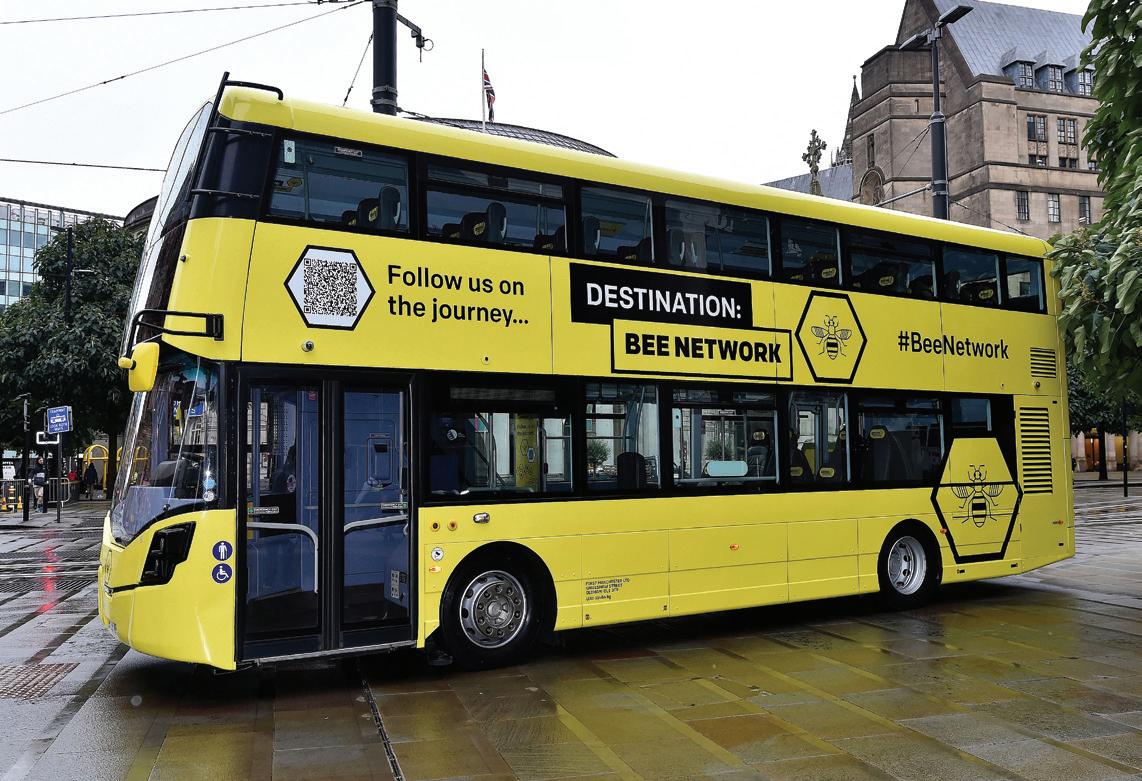
NETWORKS
Vernon Everitt, Greater Manchester’s transport commissioner, told Transport Focus board members last week that the region was on the cusp of “something genuinely transformational” as it moved to begin rolling out the fully integrated Bee Network. He said the entire network had been designed to optimise economic productivity while ensuring Greater Manchester became an inclusive place to live and work.
“It’s bringing together buses, Metrolink, the active travel side of things and, ultimately, local rail into one system,” Everitt explained. “It’s not here to absolutely replicate what happens in London, but some of the core elements that have made London a successful public transport operation are applicable here. Integration is at the heart of it, including integrated ticketing and information alongside those rock solid, high quality safe, affordable, reliable day-to-day services.” He said that improving public transport in Greater Manchester would enable “other stuff”.
“It’s not an end in itself,” Everitt added. “The Bee Network can deliver more jobs, more businesses, more homes and inclusion.” In addition, he said the Bee Network would deliver better sustainability for the region by giving people a better alternative to using their cars.
Everitt continued: “That’s not an
anti-car statement. There are lots of car journeys that are absolutely essential, but at the moment [they account for] over two-thirds of the journeys in this region... we want to offer them a decent, affordable, reliable alternative to their vehicle. That’s what makes me extremely optimistic about patronage.”
He said he felt there was a massive market for Greater Manchester to go after with the Bee Network, much of which will be fuelled by the population growth the region has been experiencing in recent years.
“If you look at Salford and the centre of Manchester, there are cranes everywhere,” Everitt said. “If you go around the 10 districts, there’s building, there are commercial developments, there are housing developments. Everyone needs to be able to move around sustainably and we believe integrated public transport is the answer.”
He pointed to the current
modal split between the car and sustainable transport. This is currently 60% in favour of the car and the first step to building patronage was to get that closer to a 50:50 split. Everitt said this equates to around one and a half million journeys each day being moved to public transport.
He continued: “We want to go much further than that and we want to go faster. We believe the plans that we’ve got in hand will enable us to do that.”
Everitt described the Bee Network as being rather similar to London Overground and its creation in 2007. He said creating the brand had allowed Transport for London to link up disparate parts of the capital’s rail network, enabling members of the public to envisage how they could make journeys by public transport in a way they couldn’t see before.
“It wasn’t evident as a network until it was painted orange,” he claimed. “We could demonstrate
to people a new way of moving around.”
Everitt also highlighted how the introduction of the £2 bus fare cap last autumn had allowed Greater Manchester to tackle unaffordable bus fares and that it was already starting to drive growth. Between September and December, bus patronage had risen by around 10% and he felt that around half of that growth had been driven by the fares intervention.
“It just goes to show that if you can price things properly - and make things simpler - they’ll use you more,” Everitt added.
But he admitted there would always be a requirement for public money to support the network. “There will always be some requirement for governments to provide support,” Everitt said. “I don’t know any bus network in the country that completely washes its face. It certainly doesn’t in London - pre-Covid the surplus on the Tube used to plug the gap in bus subsidy. We will continue to need support but we recognise we need to raise money locally. There’s lots of money going into this which has been raised here.”
When probed further on the finances of Greater Manchester’s plans by board member Arthur Leathley, Everitt returned to growth and claimed there was a “massive revenue upside opportunity”. He pointed to Metrolink where patronage was already ahead of 2019’s figures in the midweek and at weekends.
“We’re edging towards 90% overall,” he said. “In London the Tube is at about 85%... The challenge [for them] is that lots of people [in London] can work from home. It’s not the same here. Many people have to be in work, so there’s a huge commuter market and a huge leisure market here [for us to go after].”
NEWS ROUND-UP 06 | 7 April 2023 www.passengertransport.co.uk
Everitt: ‘Bee Network about delivering growth’
TfGM outlines plans for new 250-bus depot
£7.5m of funding secured for potential site at Central Park
FACILITIES
Transport for Greater Manchester (TfGM) has announced plans to construct a new 250-vehicle electric bus depot as part of its plans to franchise the region’s bus network.
It follows on from plans for a new bus depot at Martland Park in Wigan which were revealed last year (PT274). No decision appears to have been made about whether to proceed with that plan, with planning permission still awaited from Wigan Council.
When franchising is introduced in Wigan and Bolton and parts of Salford and Bury on September 24, 50 brand electric buses will be introduced on day one, alongside
FINAL COUNTDOWN TO BEE NETWORK
Agreement to repaint buses ahead of launch
BRANDING
With exactly six months to go before the launch of the first phase of bus franchising in Greater Manchester, mayor Andy Burnham has unveiled the first Bee Network branded bus.
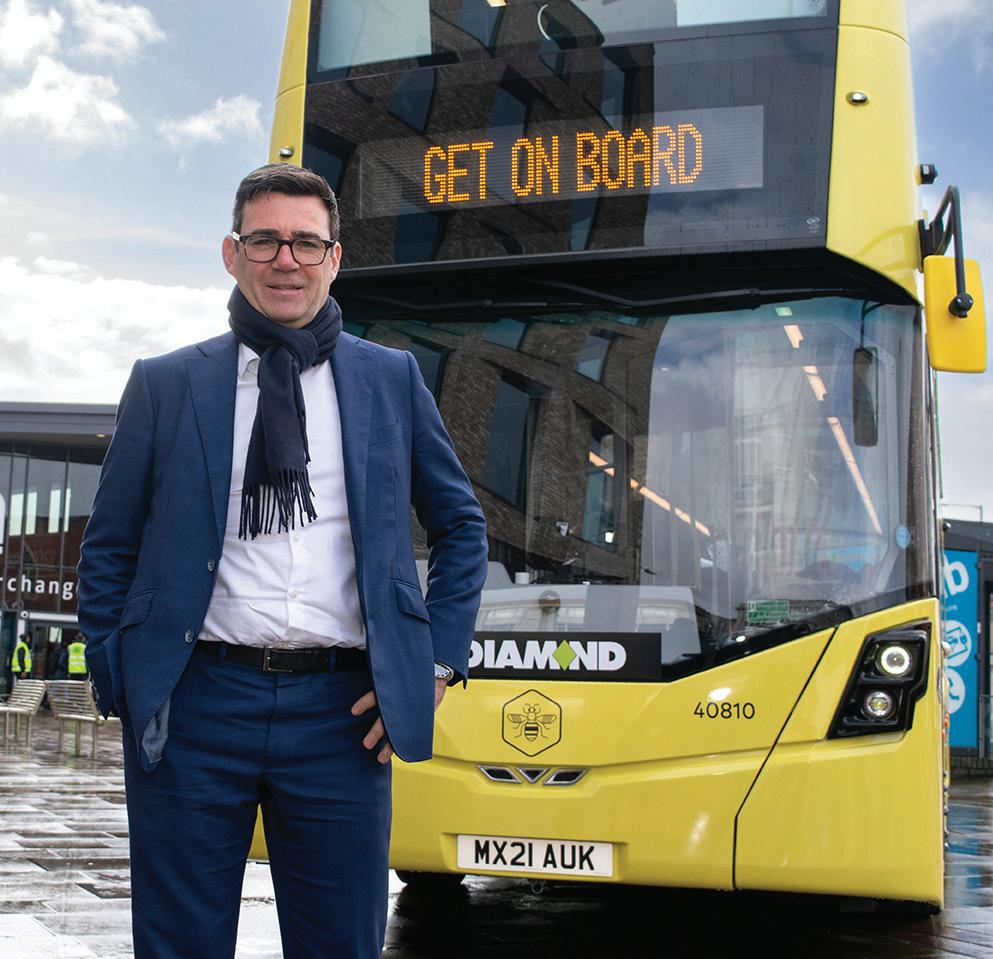
Operated by Diamond Bus on its Route 8 service between Bolton and Manchester city centre via Farnworth and Salford, it is one of a number of Diamond Bus vehicles that will be repainted in Bee Network livery ahead of the launch of the first franchised services in Wigan and Bolton and parts of Salford and Bury on September 24.
new Euro 6 vehicles and dozens of what TfGM is terming “cobranded” buses from the existing fleet. A further 50 electric buses will also be introduced in March 2024, when the second phase of franchising gets underway in the north east of the conurbation.
Meanwhile, TfGM has now confirmed a further 170 electric buses will be introduced in and around Stockport by 2024. These vehicles will be jointly funded by Stagecoach and local and national government, with Stagecoach’s £37.2m investment matchfunded by £35.7m from Greater Manchester’s Zero Emission Bus Regional Areas (ZEBRA) fund and a local contribution of £12.5m.
To support the roll out of these significant numbers of vehicles, the region has now been awarded £7.5m from the Department
of Levelling-Up Housing and Communities to buy land for a leading, state-of-the-art electric bus depot. TfGM has confirmed it has identified a potential site at Central Park near Monsall has now been identified.
Andy Burnham, the mayor of Greater Manchester, said the new facility would be a “world-class electric bus depot”.
He continued: “This is very much the start of our journey that will ultimately deliver a greener, integrated and more inclusive transport system that will transform how people travel around our city-region.”
TfGM has said it is also looking to take control of existing depots by buying or leasing them, before “refurbishing and transforming them” into “modern, high-tech, sustainable facilities”.
PERMIT SYSTEM OUTLINED
TfGM publishes plans for Local Service Permits
REGULATION
Transport for Greater Manchester (TfGM) has released plans for the Local Service Permit regime that will be required for non-franchised bus services after bus franchising is progressively introduced across the conurbation from later this year. The proposals are similar to the London Service Permit regime that operates in the capital.
Permits will primarily be required for cross-border services, but TfGM has said they may also be needed for some rail replacement services. However, closed-door transport to schools and services operated under Section 19 or Section 22 provision will not require permits.
TfGM will require information from applicants to assess compliance with the two statutory tests: that the proposed service will benefit persons making journeys on local services; and that the proposed service will not have an adverse effect on any franchised local service.
Categories of conditions that may be imposed include fares, ticket acceptance, service information, and vehicle and operational standards. TfGM proposes that Euro 6 or better buses will be required on all services operated under permits.
The overall permit procurement process would take 17 weeks with a minimum of 98 days’ notice required, allowing TfGM to consider any “infrastructure issues.” The period of time between when the permit is granted and the effective date would be a further 70 days, although that could reduce in the case of a legitimate short-notice application.
That timescale suggests that the process for obtaining permits in the first area to be franchised - Wigan and Bolton - will have to commence next month.
Andy Burnham revealed the first Bee Network bus
www.passengertransport.co.uk 7 April 2023 | 07
“This is very much the start of our journey”
Rail users angry at TfW service disruption
Many lines have shortened trains or no trains at all
PERFORMANCE
There were rare moments of joy recently for Transport for Wales Rail with the official launch of the operator’s new Class 231 FLIRT trains, followed a few days later by the delayed entry into passenger service of Vivarail Class 230 units. These events came amid a rolling stock crisis, with most Class 175 units out of use for repairs and many lines having shortened trains, cancellations or no trains at all. One passengers’ group suggested there had been a failure of TfW’s senior management and called for an independent review.
For almost five years, TfW and the Welsh Government have been promising that reliability and passenger capacity would improve with the introduction of new train fleets worth £800m. Transport minister Lee Waters presided at the official launch of the Class 231s, 11 of which have been ordered for local services in South Wales.
Schoolboy Morgan, from Ystrad Mynach, unveiled the name ‘Sultan’ on one of the units. He won a competition by writing a poem about the giant earth sculpture near his home of a pit pony named Sultan.
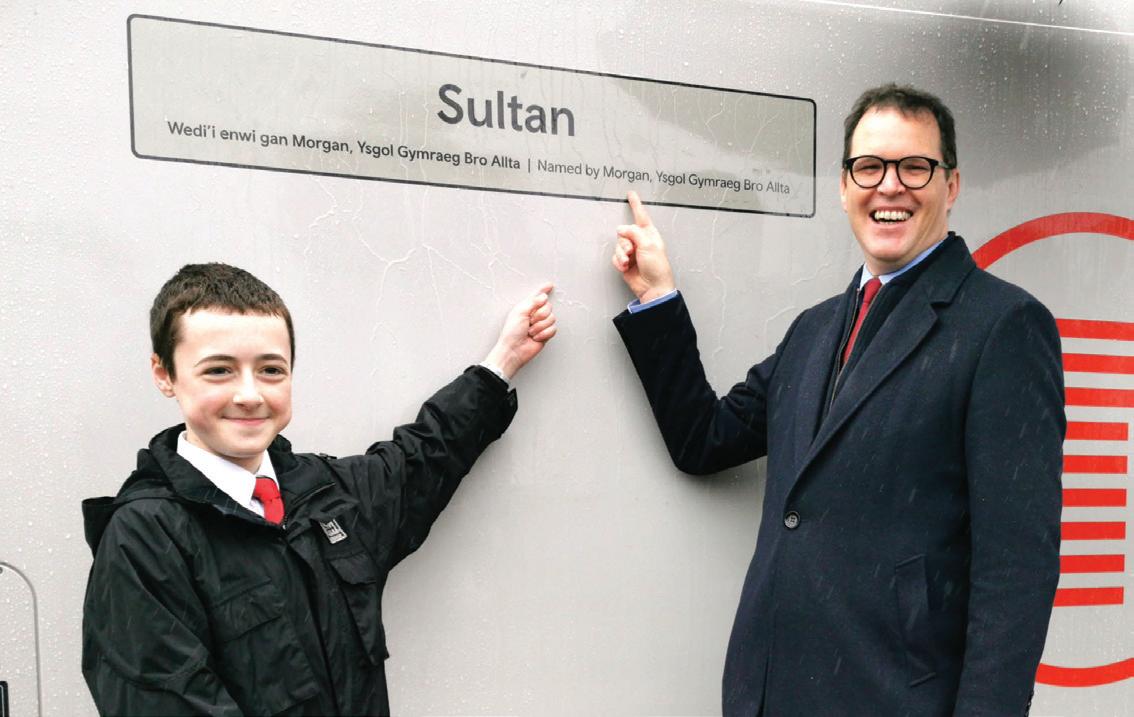
On Monday, the first of five Class 230 units which TfW Rail bought for £25m in 2018 began passenger service on the Wrexham-Bidston line, four years later than planned. The units are former London Underground stock fitted with battery and diesel equipment.
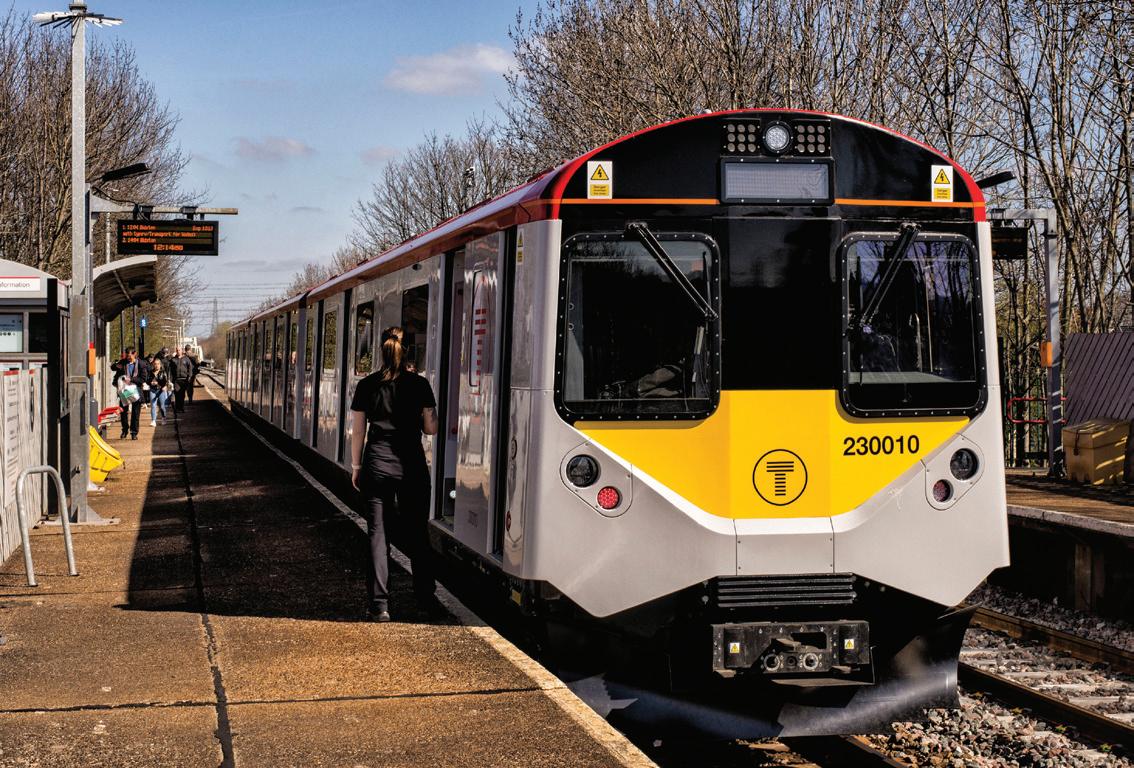
The delayed introduction of new train fleets leaves TfW Rail
in another pickle as the Easter holidays signal the start of the main tourism season. Almost all of the fleet of 27 Class 175 units, the mainstay of TfW Rail’s inter-urban services, remain out of service after a spate of fires in February. Even the Llandudno to Blaenau Ffestiniog line, a gateway to Snowdonia national park, remained closed in the first week of the holidays. Services on the Birmingham-Aberystwyth and Heart of Wales lines - popular with visitors - also suffered cancellations and part-cancellations.
On March 2, TfW Rail’s chief
operations officer, Jan Chaudhryvan der Velde, said: “We’ve had to take some of our Class 175 trains out of service while we run some enhanced maintenance routines on them for safety reasons. Now, this is going to leave us a little bit short of rolling stock for a few days while we put all the trains through this enhanced maintenance.”
The units require more work than anticipated. By now, they should have been replaced by Class 197 DMUs from CAF, the first of which entered passenger services approximately a year late last November. However, only
half a dozen of the trains are being used each day, and only three of the Class 231s. The rest of the legacy fleet has to cover those services which have not been precancelled, including widespread use of Valley Lines Sprinter units for journeys of four hours or more.
The Wrexham-Bidston Rail Users Association expressed the frustration felt by many passengers on 28 March, when the line’s trains were withdrawn once again and replaced by buses which take twice as long - almost two hours for a journey of 28 miles.
“The introduction into service of new rolling stock by TfW has been an unacceptably protracted affair,” said the WBRUA on 28 March. “Unfortunately, this is yet another item on an increasing list of failures to deliver what was promised and expected.
“Significant public money has been spent without the benefits from the investment being realised in a timely manner. Ticket revenue is continuously being undermined.”
It said there were few passengers on the replacement bus services. It was aware of one who had changed job because TfW Rail has suspended the train service, during resource shortages, many times since autumn 2018. “All the foregoing points to a complete failure of senior management at TfW. The WBRUA believes that the Welsh Government should instigate an independent review of TfW to determine where the root cause of the problems lies and what needs to be done to rectify the situation.”
With the first Class 230 unit in service, the usual hourly train service was two-hourly on Monday. The differential journey times meant that the train arrived at each end of the line at almost the same time as the intermediate hour’s bus replacement service.
NEWS ROUND-UP 08 | 7 April 2023 www.passengertransport.co.uk
The first day of Class 230 operation
Schoolboy Morgan names the first Class 231 unit alongside minister Lee Waters
TfL to achieve financial sustainability in 2023/24
Revenue of £9.1bn will cover expected operating costs
FINANCIALS
Transport for London (TfL) is set to achieve financial sustainability with its latest budget projecting an operating surplus of £79m in 2023/24.
The budget of £9.1bn in revenue is anticipated to fully cover TfL’s expected operating costs of £7.9bn, £745m in capital renewals, and £417m in net interest costs.
Patronage on TfL networks continues to grow, with over three million Tube journeys and around five million bus journeys made on weekdays. The Elizabeth Line also continues to exceed predicted ridership levels, with around 600,000 journeys made every weekday across the entire line.
KHAN REVEALS SUPERLOOP
NETWORKS
London mayor Sadiq Khan has unveiled plans for a new network of limited-stop express bus routes called the Superloop, which will connect outer London town centres, railway stations, hospitals and transport hubs.
The network aims to provide quicker journey times, with £6m in initial funding from the mayor to launch the network as part of efforts to improve suburban bus services ahead of the controversial expansion of the Ultra Low Emission Zone. Transport for London said Superloop is on top of and
TfL’s latest assessment assumes a further 7% increase in patronage by the end of 2023/24, compared to current levels. The organisation is currently delivering £600m in savings commitments as set out in its business plan, having already saved £1.1bn from its annual operating costs since 2016.
The budget for 2023/24 will also invest £2bn in capital improvements across the transport network, with any government funding allocated to fund capital investments.
It also ensures the delivery of a number of schemes, including the controversial expansion of the Ultra Low Emission Zone to all London boroughs, introduction of a £110m scrappage scheme for non-compliant vehicles, and more zero-emission buses.
TfL has also set out plans for
complements a million additional bus kilometres committed by the mayor in the capital’s outer ring.
The new network will be introduced in stages and four of the Superloop routes are already in operation: they are Route X26 from Croydon to Heathrow Airport; Route X140 between Heathrow Airport and Harrow; Route 607 from Uxbridge to White City; and Route X68 from Russell Square to Croydon.
All of these routes will be branded as part of the Superloop network and they will use a new roundel and bus livery to ensure clear identification, but TfL stresses they will still be recognisable as part of the London Buses network. Superloop branding will also feature on maps, timetables and other pieces of information.
Of the six new proposed Superloop
a number of active travel and accessibility improvements to the transport network. The budget will also deliver improvements to the bus network in outer London and new trains on the Docklands Light Railway, 54 of which will be in service by 2026. Work also continues to introduce new trains on the Piccadilly line.
The 2023/24 budget has been developed on the assumption that the current funding agreement with government, which lasts until April 2024, remains in place and is fully honoured, including in relation to adjustments to take into account inflation.
While the current funding agreement with the government is secure until the end of March 2024, TfL said there is a pressing need for the ministers to confirm the £475m that TfL needs in
routes one, linking Grove Park with Canary Wharf via the new Silvertown Tunnel’s public transport lanes, has already been consulted on. The other five routes will all be consulted on separately between now and spring 2024. They include a new route between Harrow and North Finchley; limited-stop express links between North Finchley and Walthamstow and between Walthamstow and the Royal Docks via Ilford; and new connections are also proposed between Bexleyheath, Bromley and Croydon in south London. Some of the benefits of the proposed Superloop network will be realised later this year, with the X26 doubling in frequency so that buses run every 15 minutes instead of every 30 minutes. Meanwhile, TfL insight work shows that the X140, which
2024/25 to support the delivery of the committed contracts for rolling stock and signalling on the Piccadilly line and the DLR.
“The government has consistently recognised in the funding settlements that TfL is not expected to fund major capital projects from its operating incomes,” said TfL. “This is consistent with other transport authorities. Failure to confirm this well in advance of March 2024 would force TfL to have to reprioritise its business plan.”
TfL has also said that if plans to terminate HS2 services at Old Oak Common for a decade or more are taken forward, it will also need to begin procurement for additional Elizabeth Line rolling stock in order to ensure there is sufficient capacity to transport HS2 passengers to and from central London.
Looking to the future, TfL said it was keen to resume work on extensions of the DLR and Bakerloo line as well as resuming planning for Crossrail 2.
was only introduced at the end of 2019, has delivered a 10-15% increase in weekday passenger demand since it was launched.
“The Superloop is the jewel in the crown in our plans to strengthen alternatives to the private car ahead of the ULEZ expanding London-wide and is a game changer for outer London,” said Alex Williams, TfL’s chief customer and strategy officer.
“For the first time we will be bringing a number of the capital’s town centres together with express orbital routes. We know these kinds of services are hugely popular from what we have seen in the rise in the number of people using the X140 during the week.”
Williams added that increasing frequencies on the routes would makes buses more attractive.
www.passengertransport.co.uk 7 April 2023 | 09
Express bus services to connect outer London
“TfL is not expected to fund major capital projects”
House of Lords debate buses amid uncertainty
Peers debate calls for long-term support for the bus sector as Baroness Vere reveals ministers will probe revisions to concessionary fares guidance
FUNDING
The House of Lords debated the future of bus services in the UK on March 30, with several members calling on the government to offer long-term financial support for operators.
Former transport secretary Lord McLoughlin asked for assurances about ongoing financial support for bus services beyond June 30, when current Covid-related support measures are due to expire.
Taking on responsibility for the buses brief once again in the debate was transport minister Baroness Vere who acknowledged to McLoughlin the need for ongoing support for the sector.
She continued: “From the government’s perspective, we have had to see what happens to patronage and where service
‘TRANSPORT FACES FUNDING CRISIS’
UTG calls for subsidy and better coordination
FUNDING
The Urban Transport Group (UTG) has called on the government to introduce a package of measures to fix the “public transport funding crisis” in a new briefing note.
UTG notes that while the Department for Transport’s budget remained broadly flat, there has been a significant reduction in projected spending on active travel, and investment in some national road schemes and HS2 have been pushed
levels have ended up, given the current levels of support. We are also looking at the impact of the £2 bus fare cap. All these things are going into our analysis of what we may be able to do to support the bus sector after June 30.”
Labour peer Lord Watts called for greater bus service regulation to be offered across the board. “If we reintroduce it right across the board and give those powers back to local authorities, they will be far more efficient in their use of bus resources,” he added.
A clearly irritated Vere countered that local authorities were required to produce Enhanced Partnership agreements with bus operators and if those arrangements failed there was a means by which they could work towards franchising their local networks.
Meanwhile, Lib Dem peer and transport spokesperson Baroness Randerson called for reform of bus service funding, arguing that the current short-term approach was creating far too much uncertainty for operators. She also called for a new funding mechanism based on greater devolution and “less interference from the Department for Transport”.
Vere acknowledged the need for reform and stated that the government would be looking at reforming the Bus Service Operators Grant (BSOG).
She continued: “This is a very important amount of money: some £250m goes into the sector, which keeps bus fares low, but we have to make sure that it also supports net zero. There are all sorts of different things we can do with bus funding. In 2021-22, 57% of all income for the bus sector came from central and local government.”
Meanwhile, a question from Conservative peer Baroness McIntosh touched on the issue of rural bus services, concessionary travel arrangements and how they will be affected beyond the current planned end of emergency government funding support for buses beyond June.
Vere confirmed that the government is not planning any changes to the levels of concessionary bus fares, but “we are looking closely at the implementation of the concessionary fares scheme”.
She continued: “Over the course of 2023 we will look closely at the reimbursement guidance and the calculator to make sure that bus operators are getting the correct amount of money for the people they carry.”
back due to cost overruns.
However, UTG said there has been no word on revenue support for bus services in England outside London, which is set to run out at the end of June. This is despite bus operators in some areas already planning further network cuts.
UTG outlined the wider crisis in public transport since the Covid-19 restrictions were removed and said public transport patronage and revenue remain significantly below pre-pandemic levels. Bus networks have also experienced significant service reductions, which follows years of service reductions before the pandemic. Additionally, the
reliability of bus and rail services has been affected by staff shortages, poor recruitment and retention practices, and industrial disputes related to the cost of living crisis.
UTG warns that in some areas, unreliability of services is becoming endemic, leading to people changing the way they travel.
While the government has provided additional revenue support for bus and light rail services to compensate for the effects of lower patronage, the conditions on the funding have allowed bus services to be reduced by up to 20% compared with pre-Covid networks.
Although public transport in
London has a medium-term revenue funding settlement, the additional funding for light rail outside London has ended, and funding for bus services outside London is now scheduled to end on June 30, raising the prospect of another round of service cuts which would disproportionately affect low income households, women, disabled people and ethnic minorities.
UTG concludes that a long term, enhanced and devolved approach to funding is needed and that this will require higher levels of subsidy than was the case pre-Covid. It also calls for a more coordinated approach to buses and light rail funding.
NEWS ROUND-UP
10 | 7 April 2023 www.passengertransport.co.uk
“We have had to see what happens to patronage and where service levels have ended up”
Who wants to go to Old Oak Common? Page 20
Holden -Lobby MPs for bus sector support
Working with Treasury
ADVOCACY
Buses minister Richard Holden has urged the bus and coach sector to get in touch their local MPs and make sure they understand the case for additional government support.
Speaking at last week’s inaugural CPT UK Bus & Coach Conference in Birmingham, Holden acknowledged how important long-term funding certainty is to bus operators and local authorities. He told delegates: “The Department for Transport is currently working with colleagues across government including with [the Treasury] - sometimes it feels like a battle rather than working together - but we are working
DON’T CUT LOCAL MANAGEMENT, WARNS HENDY
Operators also urged to embraced franchising
MANAGEMENT
Lord Hendy of Richmond Hill has cautioned against bus company management cuts.
Addressing last week’s last week’s inaugural CPT UK Bus & Coach Conference in Birmingham, the Network Rail chair, who describes himself as a bus person, said he was pleased by the launch of the Bus Centre of Excellence to help upskill, recruit and retain a new generation of bus professionals (PT285).
“I think it’s essential because you all know that many local transport
with them to develop a plan for the future to help the sector into a more sustainable footing.
“I would like to thank many of you for the helpful contributions to our recent roundtable and for continuing to work with my officials and I hope to have more details to share with you soon.”
However, he urged the bus and coach sector to do their bit to make the case. “Please continue to play your part,” he said. “There is nothing that is more effective across government than having you reaching out, particularly to backbench MPs ... writing to me, writing to the
prime minister, writing to the Treasury, to say how important it is. Reach out to them, they are your best advocates. They are free advocates for you in parliament. Reach out, get them involved, get them down to depots, and get them lobbying on your behalf.”
Sir Peter Hendy, chair of Network Rail and a longstanding supporter of the bus sector, later told delegates that they have been “well served” by officials in the DfT. “The DfT has argued very strongly to the Treasury for the money to support services, not only during Covid but after it as well,” he remarked.
LABOUR WILL ‘PUT THE PUBLIC BACK IN CONTROL’
Support for franchsing and new municipals
POLITICS
Shadow buses minister Simon Lightwood has said a Labour government would make bus franchising available to all local authorities and support the creation of new municipal bus companies.
“The current model is broken so the next Labour government will put the public back in control,” he told last week’s inaugural CPT UK Bus & Coach Conference in Birmingham. “We’ll hand power and control to the communities that rely on bus services. We would offer local areas the chance to franchise bus services.”
He added: “In government we would follow what Scotland have recently done, and what Wales are looking to do, and reverse the ban on forming new municipal companies in England and give authorities a credible alternative.”
authorities don’t really appreciate the role of the bus in quite the way that you do, and actually they don’t really appreciate the role of it in the economic and social prosperity of their towns and cities,” he said. “And many of them don’t have the officer cadre and the skills to manage the road network to enable you to provide an effective and reliable service.”
He said that during his 15 years at Transport for London he came up against boroughs who did not understand the volume of bus journeys taking place on their highways, or their importance.
However, he also warned bus operators that they needed to play their part. “Every time I see some of the bigger operators stripping out local management, frankly I wince,”
Hendy told delegates. “My own view is that you can’t respond to local passengers, local markets and local authorities from one hundred miles away. The real danger is that your passengers and drivers know what needs to be done to the bus service but somehow you don’t.
“And as for getting rid of general managers I have to say, and there is a personal prejudice here, but that really is a retrograde step.”
He recalled being at London Transport in the 1970s when a row between the engineering supervisor and the operating supervisor at a bus garage “had to go up about eight management levels to get resolvedand the consequence is a really poor service offer to the public”.
Meanwhile, Hendy told bus operators that they could gain from
the introduction of bus franchisinga revesal of deregulation that many of them have opposed. Between 2001 and 2015 Hendy was responsible for London’s bus network, the largest franchised network in western Europe. “What I used to say then, much to the irritation of some of the PTE people is still what I think is true - which is that actually that system works if there is enough money to fund and operate and market it as an integrated network,” he said. “And if you have got that money then why wouldn’t you do it?
“I think that if Manchester believes that it does have the money and they do it then actually some of you will gain out of it ... It is about embracing change and moving forward and I don’t necessarily think it’s the wrong thing to do.”
“Reach out, get them involved, get them down to depots, and get them lobbying on your behalf” Richard Holden
sometimes ‘feels like a battle’, says minister
www.passengertransport.co.uk 7 April 2023 | 11
NAO says Euston plans should be reassessed
reassessment of plans concerning London Euston station, which is now expected to cost £4.8bn, and is currently £2.2bn over budget.
HS2
The National Audit Office (NAO) has warned that the delay in building the final stretch of the HS2 high speed rail line into London Euston, as well as the Birmingham to Crewe leg of the line, will lead to additional costs for the project.
The project’s overall price tag has increased from £33bn a decade ago to as much as £100bn, and the line has suffered reductions to its scope as ministers have tried to get a handle on its budget.
The report from the public spending watchdog highlights the challenges faced following years of delays and cost overruns. The NAO recommends the
In November 2020, the Department for Transport instructed HS2 Ltd to pause construction on the 11-platform design to begin work on a new 10-platform plan. But the NAO report found this new plan was now £400m more expensive than the original plans.
In Autumn 2021 the DfT also directed HS2 Ltd to integrate more closely with Network Rail’s
redevelopment of the existing station and confirmed the extent of the surrounding commercial and residential developments. Much of the previous design work was then scrapped, at a cost of £106m to the taxpayer.
Although the move to a 10-platform design, plus plans to delay delivery of the station would allow spending to be deferred in the short term, it would also only further increase costs. The NAO said this was as a result of supply chains stopping and restarting, contractual changes and managing work sites for longer.
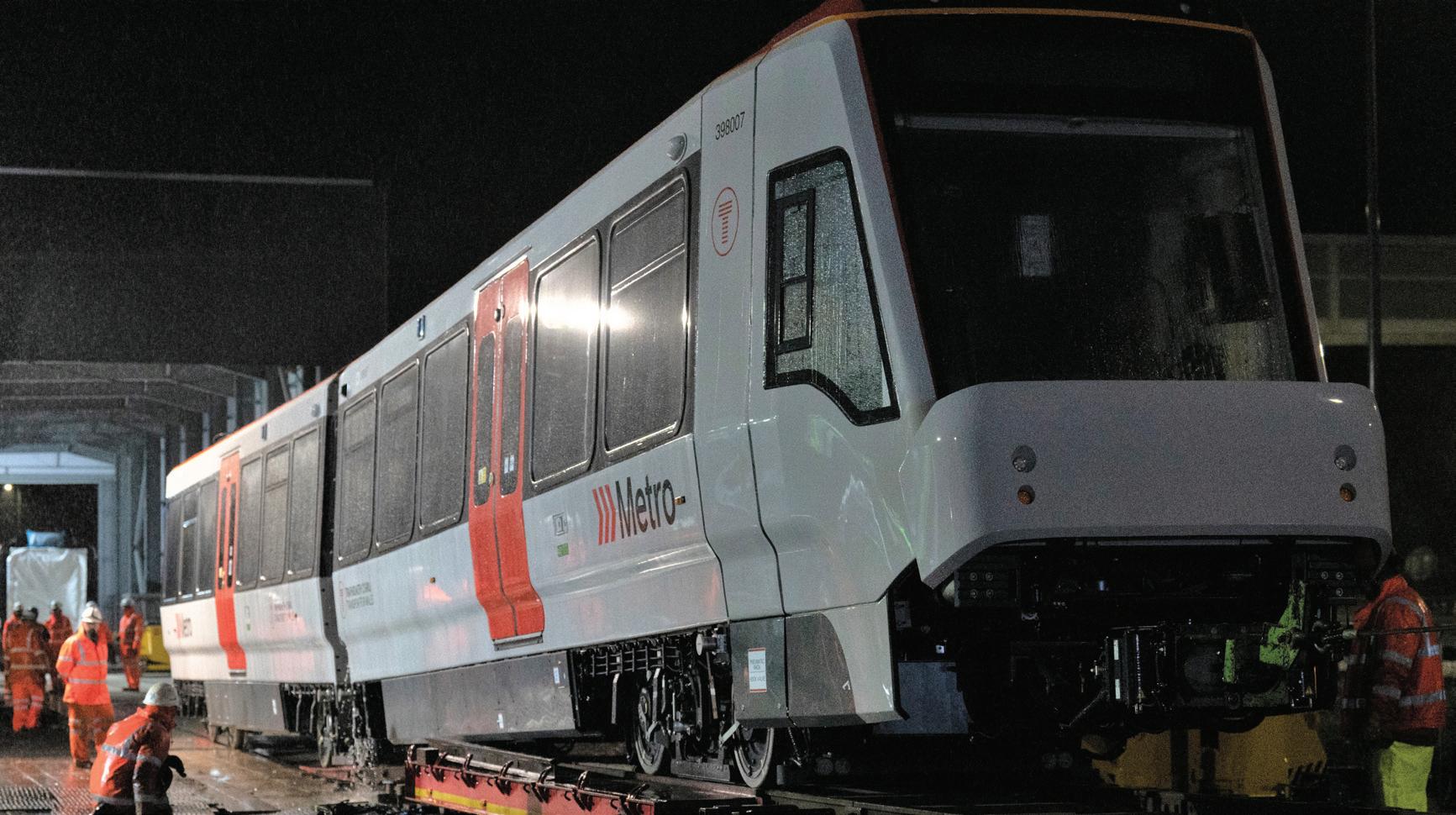
“Clearly the 2020 reset of the station design has not succeeded,” said Gareth Davies, comptroller and auditor general at the NAO. “DfT and HS2 Ltd have not been able to develop an affordable scope that is integrated with other
activity at Euston, despite their focus on costs and governance since 2020. Recent high inflation has added to the challenge.
“The March 2023 announcement by the transport secretary pausing new construction work should now give DfT and HS2 Ltd the necessary time to put the HS2 Euston project on a more realistic and stable footing.”
The NAO report adds that the government should consider resetting HS2’s costs and budget into 2023 prices, and look at whether the Treasury, rather than the DfT, should absorb the costs of rising inflation.
In response, the DfT said it remained committed to HS2 “in a way that delivers the best value for money to the taxpayer”.
HS2 Ltd said Euston was “one of the most complex parts of the route to build”. “We are committed to working with DfT and partners to consider the recommendations of the NAO report,” it added.
CALL FOR PROJECT ‘STAYING POWER’
Commission urges focus on targeted initiatives
INFRASTRUCTURE
The government must develop stronger staying power and focus on fewer, bigger, better targeted initiatives to deliver the infrastructure needed to meet long term goals, according to the National Infrastructure Commission’s annual report. It has also called for a “greater sense of certainty” around progressing HS2 and Northern Powerhouse Rail and a move away from competitive bidding processes for funding. It has also called on ministers to follow through on commitments made in 2018 for the Cambridge-Oxford growth arc.
HS2 delay will only lead to new costs, says spending watchdog
“Clearly the 2020 reset of the station design has not succeeded”
NEWS ROUND-UP 12 | 7 April 2023 www.passengertransport.co.uk
COMING TO THE VALLEYS The South Wales Metro has taken another step forward with the arrival of the first Class 398 tram-trains to the new Taff’s Well depot, following extensive testing over several months at Network Rail’s Rail Innovation and Development Centre in Leicestershire. Stadler are building 36 Class 398s for Transport for Wales.
blame us for stalling bus progress. Page 25
Insight reveals impact of £2 fare cap on users
Transport Focus finds £2 bus fare cap is helping save money
FARES
A recent survey by Transport Focus has found that the introduction of the £2 bus fare cap in England has encouraged more people to use buses as their preferred mode of transport. The watchdog spoke to over 1,000 individuals to understand the impact of the fare cap on reducing the cost of living.
Over 10% of respondents stated that they are now using the bus to travel more often, with over 40% believing that the new fare helps them to save money. Additionally, 80% of participants thought that the fare cap would help individuals with the cost of living, and more than 40% said that their bus journeys were replacing those they would have made by car.
Looking to the future, 49% of those surveyed said they would
SHORT EXTENSION FOR BUS FUNDING
Welsh move aims to act as a bridge for further reform
FUNDING
Welsh deputy climate change minister Lee Waters has announced an extension to the Bus Emergency Scheme (BES) for a further threeweek period to the end of the current academic year on July 24. The scheme has already seen over £150m spent by the Welsh Government to keep bus services running during the pandemic. Waters said the extension will provide stability for the industry while the
use the bus instead of making a car journey, while 41% thought that the £2 fare would enable them to travel to destinations they would not have otherwise visited. The Transport Focus survey also found that awareness of the £2 fare cap increased from 53% in January to 56% in March 2023.
Transport Focus director David Sidebottom said: “Our research shows the £2 bus fare is having a big impact in helping more people get around by bus and putting more money back in their pocket. Cheaper fares are vital in winning passengers back and providing a lifeline for bus routes up and down the country.”
The £2 bus fare cap was introduced by the UK government in January 2023 for all single bus journeys in England, excluding London. The scheme is voluntary, and while some bus companies have chosen not to participate, most major bus operators are now
government transitions away from emergency-style funding to better suit new travel patterns that have emerged post-pandemic.
To address the challenges of the funding regime change, Waters has asked Transport for Wales, local authorities, and the Community Transport Association to establish regional network planning teams.
“This will help optimise the network and maintain as much reach and access as possible,” he said.
Waters emphasised the importance of a sustainable bus network for Wales, and to achieve this goal, he has asked Jonathan Bray, the outgoing director of the
taking part. The fare cap was previously introduced in Greater Manchester, Merseyside, and West Yorkshire in the autumn of 2022 as a result of local initiatives.
Go-Ahead has revealed its subsidiaries have now carried more than 10 million passengers who have had their fares capped at £2. Brighton & Hove and Metrobus are Go-Ahead’s biggest venders of capped fares, where more than 2.5 million passengers have travelled at £2.
On certain routes Go-Ahead reports passenger numbers have jumped significantly; for example, a route between Heathrow Airport and High Wycombe operated by the group’s Carousel Buses operation has seen a 130% uplift in passengers since the beginning of the year.
The Office for National Statistics has cited the introduction of the £2 fare cap as a contributing factor to the slowdown of inflation in January.
Urban Transport Group, to lead a panel of experts. The panel will provide advice on implementing the Welsh Government’s ambitious plan to reform bus services in Wales, known as ‘One Network, One Timetable, One Ticket’. The membership of the panel will be announced in due course.
Waters said the Welsh Government will continue to work with local authorities and operators to maximise the funding available for the remainder of the financial year and will provide an update in due course. He continued: “This will need to act as a bridge to our franchising plans.”
IN BRIEF
ALL CHANGE AT LARBERT
Alexander Dennis has announced plans to expand its Larbert head office and facility into a bus manufacturing site from August 2023 when production of the next generation Enviro400EV double decker will launch there. The expansion will convert existing warehouse space into production lines, supporting the company’s 690-plus jobs. The move will expand Alexander Dennis’s UK manufacturing footprint from two to three production sites and responds to increasing demand for zero-emission buses.
SMARTZONE CHANGES
Oxford SmartZone, which includes bus companies Stagecoach, Thames Travel, Oxford Bus Company, and Arriva, has announced that prices for season tickets will rise by an average of 8.5% from April 16, the first increase since February 2022. Day tickets will remain at existing rates and will be valid for 24 hours on Stagecoach services. However, the tickets will cease at the end of the operational day on Oxford Bus Company, Thames Travel, and Arriva buses. Single tickets within the scheme area will remain frozen at the national £2 fare cap until further notice.
OXFORD’S GOLD STANDARD
Oxford Bus Company has been awarded a National Express ‘Golden Spanner’ award for excellence in engineering, with inspectors praising the Go-Ahead subsidiary’s engineers for achieving exceptional standards. It is the third time the company has won the award, and confirms its ‘gold standard’ ranking as an exceptional operator, according to National Express.
Don’t
www.passengertransport.co.uk 7 April 2023 | 13
‘SUPER DEPOT’ FOR PORTSMOUTH
First investment as GSC buys Southampton depot
FACILITIES
First Bus has announced plans for a new ‘super depot’ for its bus operations in Portsmouth with a clean-sheet approach that will see the facility custom designed to house up to 90 electric buses.
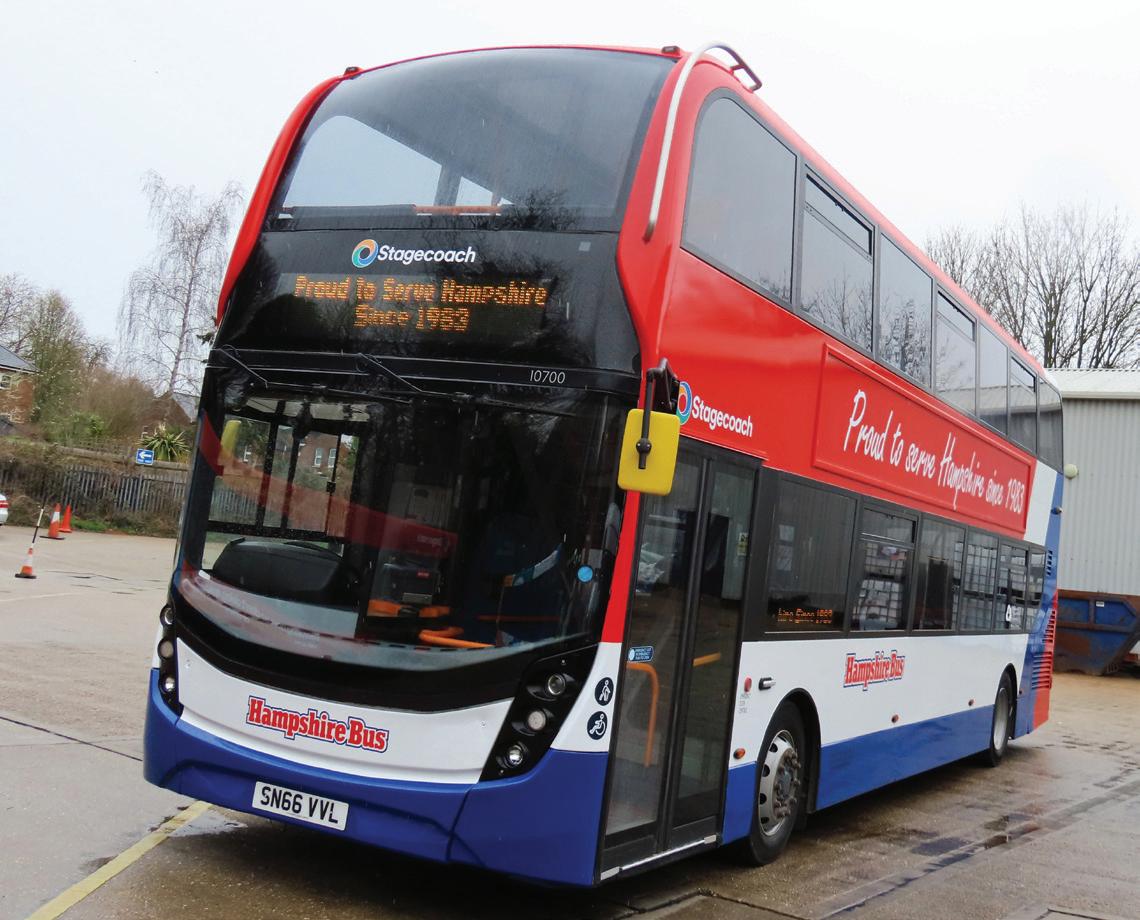
The site in Hilsea is opposite First’s existing depot and was latterly a Daily Mail Group printing plant which closed in 2020 when production was transferred elsewhere.
First Bus has confirmed it has now taken ownership of the site and the new depot will take between two and three years to build. Perhaps with a nod to the operator’s recent decision to close its Southampton operation (PT278), it adds that the plans represent a significant investment and future commitment to bus operation in Portsmouth.
First Bus South managing director Simon Goff said: “We are thrilled to have secured this new site and to share the good news with our customers and our colleagues.
“This will have a massive impact for the better on the daily working lives of our hard-working staff and we cannot wait to share the improvements with our customers.”
The move has also been welcomed by local stakeholders. Lynne Stagg, Portsmouth’s cabinet member for transportation, said the investment represented a “huge commitment to public transport”.
Meanwhile, Go-Ahead subsidiary Go South Coast has now completed its acquisition of the former First Bus depot at Empress Road in Southampton. A variation to the operator’s licence allows up to 154 vehicles to be operated from the facility. It has not yet been confirmed whether this will lead to a reshuffle of work between existing GSC Bluestar depots at Eastleigh and Totton.
New AV rules aim to boost bus accessibility
which can be a significant barrier for disabled individuals.
ACCESSIBILITY
The government plans to introduce new laws that will require almost all local bus and coach services in Great Britain to provide audible announcements and visual displays identifying the route, direction, stops and the beginning of any diversions.
The changes will be implemented gradually, with almost all vehicles required to comply by October 2026. The government said it will support the industry to upgrade vehicles with £4.65m set aside to help smaller operators comply with the law.
The Department for Transport said only 30% of buses outside London provide this information,
The new rules will provide clear audible and visible information, which will benefit all passengers, providing confidence that they will not be left stranded at the wrong stop.
“Everyone deserves to take the bus with confidence, and this is a massive boost for passenger independence,” said buses minister Richard Holden.
“Simple and effective audible and visible information should be a baked-in feature of a modern bus service to help people reach their destination, wherever they travel in Great Britain.”
Guide Dogs, which has campaigned for many years on the issue, expressed delight that the government had taken this significant step. “Our research
shows that over half of people with sight loss have missed their stop due to a lack of AV, and many people avoid bus travel altogether because buses remain inaccessible,” said Guide Dogs chief executive Tom Wright.
While the industry has broadly supported the move, some operators have raised concerns. Bill Hiron, managing director of Stephensons of Essex and chair of ALBUM, the organisation that represents smaller operators, told Passenger Transport he had concerns about the burden it would place on independent operators.
“We have over 130 buses and 100 bus routes, some of which are very infrequent and some of which are very long,” he said. “Managing and updating those systems places a huge logistical burden on us.”
TAKE NOTE
NEXT YBMN MEETING
Booking is still open for the Young Bus Managers Network’s spring conference, which will be held on May 24-25 in Birmingham. Further details about the event can be found online at www. youngbusmanagers.org.uk.
DON’T COMPOST IT!
Our printing and mailing operations have recently moved to a new plant that did not have a sufficient stock of our usual compostable wrapping available to mail the last issue to subscribers. Rather than delaying dispatch, we opted to use plastic wrappingapologies for any confusion!
A REAL 80S REVIVAL Stagecoach South has marked the 40th anniversary of the creation of predecessor operator Hampshire Bus by repainting a bus into Hampshire Bus livery. Gordon Frost, Stagecoach South’s interim MD, said the move showed the company was “proud of our heritage”.
NEWS ROUND-UP 14 | 7 April 2023 www.passengertransport.co.uk
Almost all bus and coach services will be covered by legislation
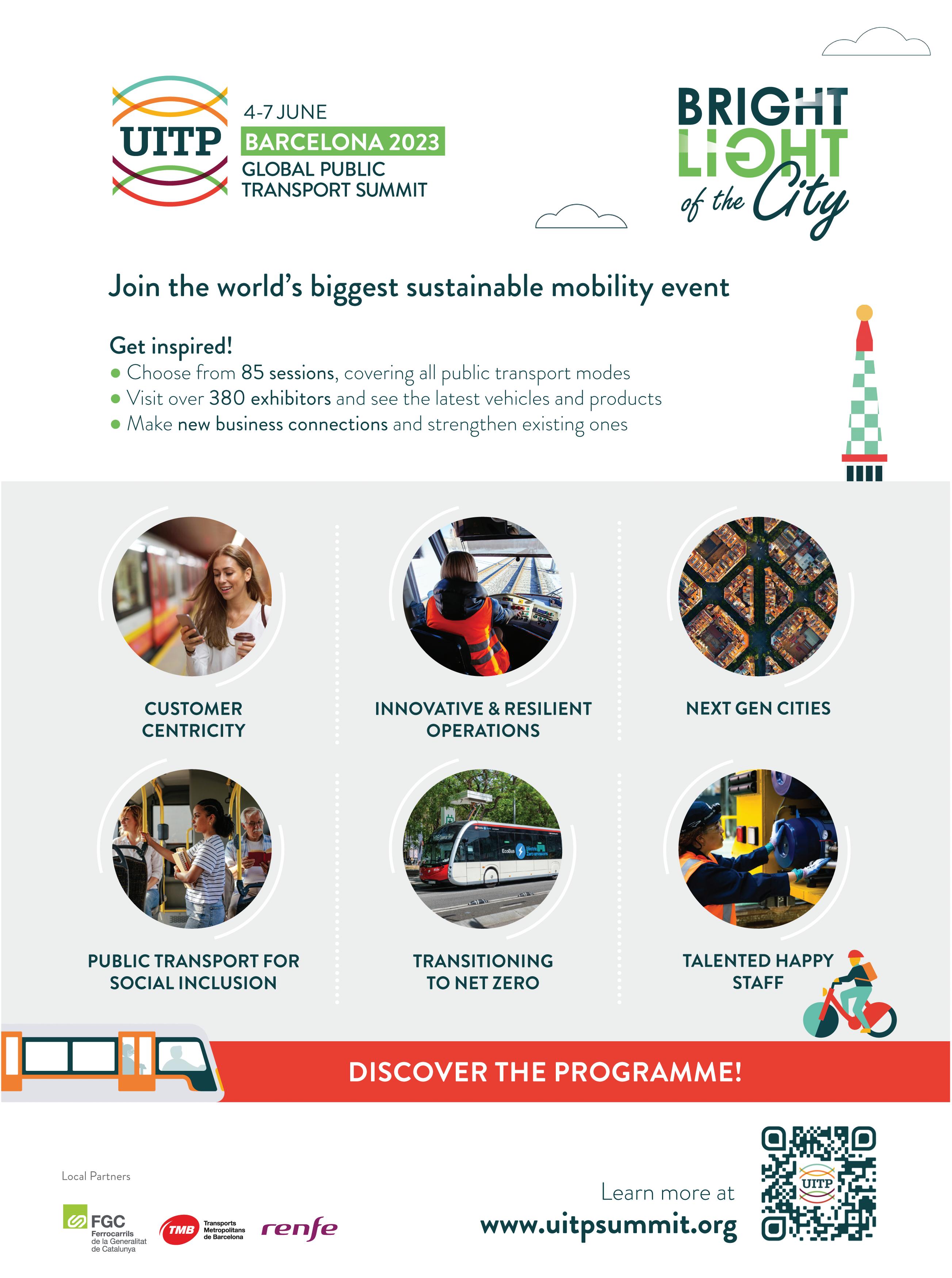
Frustration at focus on electric car investment
STRATEGY
Last week saw the government reveal several new green energy policies and decarbonisation commitments, intended to help it meet the country’s climate change goals - but the emphasis on electric vehicles drew criticism. Dubbed as the UK’s ‘Green Day’, the announcements form the backbone of a green industrial strategy - billed as the UK government’s response to the Biden administration’s Inflation Reduction Act. Part of the announcement is £380m to grow the UK electric vehicle (EV) charging network - the funding will support the rollout of EV charge points throughout the UK.
LONDON TRAMS DEPOT GETS GRANT
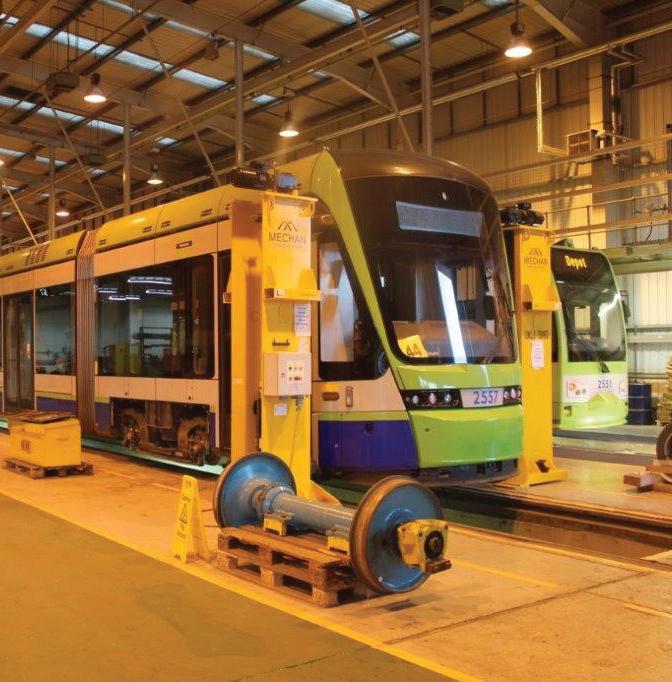
£592,000 of funding to decarbonise Therapia Lane
DEPOTS
The London Trams depot on Therapia Lane in Croydon is set to become cleaner, greener and cheaper to run after it secured a £592,000 government grant.
The funding was awarded as part of the Department for Energy Security and Net Zero Public Sector Decarbonisation Scheme which aims to provide grants for public sector bodies in England to fund heat decarbonisation and energy efficiency measures.
The project will see the heating systems upgraded with a mixture of efficient heat pumps and
Speaking at last week’s inaugural CPT UK Bus & Coach Conference in Birmingham, CPT chief executive Graham Vidler expressed his exasperation at the plan: “The report is quite clear that relying on electric cars means that the marginal cost for people to use them will be much lower and congestion is going to go up. What a place to be.”
Audrey Denis, strategy manager at Cubic Transportation Systems, shared his frustration. “It’s frustrating to see the UK’s new green strategy once again centre around electric vehicles - which
bring a multitude of challenges in the pursuit of net zero,” she said.
“While alternate fuel sources are important, even an electric vehicle is taking up valuable space on our roads, contributing to congestion. The rapid increase of cars will require more road-buildingwhich in itself will cancel out 80% of the carbon savings from a switch to electric over the next 12 years, analysis shows. If use of electric vehicles reaches 80% by 2050, this would also require an additional 150 gigawatts of electricity for charging them, which risks offsetting the positive
climate impacts.”
Denis argued that pro-public transport policies are the best way to cut car dependency.
“With the right tools, passenger behaviour can be changed - or ‘nudged’ - to make an impact on traffic and pollution. That’s where digital mobility comes into play: solutions that can synchronise siloed transport systems across the mobility network, enabling regional, national and international stakeholders to collaborate effectively and make wellinformed decisions. This allows us to connect everything, from local buses to ridesharing to traffic management, to provide one efficient, coordinated journey.”
Denis said that reducing private car use and reallocating road space to active travel and public transport would help make cities “more livable, equitable, healthy and sustainable” and is “an essential factor when considering a genuinely world-leading and competitive green agenda”.
NORMAN BAKER: PAGE 18
infrared panel heaters that will replace ageing and inefficient gas boilers. The additional electricity consumption from the new heating system is planned to be offset by using 1,800m2 of south-facing roof space for solar panels, as well as other energy efficiency measures such as improved insulation and LED lighting.
EQUIPMAKE’S COACH DEAL
Diesel coaches will be converted to electric
ELECTRIC VEHICLES
Equipmake, the UK developer and manufacturer of electrification products for the provision of electric vehicle drivetrains, has agreed a partnership with London-based Westway Coaches to accelerate the repowering of its fleet.
Having established its technology through multiple bus fleet repower agreements, Equipmake is expanding its electrification offering to the coach sector, collaborating with Westway Coaches, which operates a wide range of luxury coaches and is an innovator in the market, being the only operator to run fully electric coaches.
The agreement will see Equipmake further accelerate the electrification of Westway Coaches’ fleet by converting a proportion of its existing diesel coaches to electric power with its drivetrain technology.
The conversion of the first vehicle, a Van Hool T917, has begun at its headquarters in Snetterton, Norfolk, and in-service prototype testing is set to begin in Q3 with the objective that further Westway vehicles are repowered over the coming months.
Featuring a 545 kWh battery pack, alongside an electric motor, inverter and efficiency-maximising HVAC system, all developed inhouse, Equipmake’s Zero Emission Drivetrain is expected to give the repowered Van Hool T917 a range of up to 220 miles, making long distances entirely possible.
The Therapia Lane depot
“It’s frustrating to see the UK’s new green strategy once again centre around electric vehicles”
Audrey Denis, Cubic Transportation Systems
£380m will help grow EV charging network - and congestion too
NET ZERO 16 | 7 April 2023 www.passengertransport.co.uk
INNOVATION & TECHNOLOGY
North Wales capping launch
Transport for Wales and 25 local operators are introducing unified multi-operator capping
TICKETING
A new multi-operator contactless EMV scheme in North Wales has been launched. Transport for Wales and 25 local operators are collaborating with technology companies Littlepay and Ticketer to introduce a unified multioperator capping scheme for bus users in the counties of Anglesey, Conwy, Denbighshire, Flintshire, Gwynedd and Wrexham.
The initiative, managed by TfW, gives passengers the freedom to travel across multiple bus operators without having to plan and purchase a multi-operator ticket in advance. Huw Morgan, head of integrated transport at TfW, said: “This innovative solution will simplify the payment process for customers and give them confidence that they are consistently receiving great value for money when travelling by bus throughout North Wales. This is a ‘first in UK’ multi-operator scheme of this scope, which Transport for Wales are proud to be supporting on behalf of the people of Wales. We look forward to seeing the positive impact of this new service.”
All 25 participating operators were existing Littlepay merchants
and were able to bring together their offerings using the Littlepay Broker service. This service handles the complexities of multioperator ticketing while giving operators and authorities the data and tools to ensure complete transparency between all parties for support, reconciliation and auditing. TfW has provided a bi-lingual, centralised passenger portal available in Welsh and English. Passengers can securely enter their payment card details to access journey history and process refund requests across all participating operators.
Paul Griffin from Littlepay said: “Riders want a hassle-free journey on public transport and unifying transit operators under a regional multi-operator scheme makes travelling from A to B a stressfree experience. Public transit becomes a very attractive option when there is no need to compare the fare prices and routes of the available operators.
“If most operators in the region are taking part in a multi-operator capping scheme, riders can simply board a bus and enjoy the best fare available without having to stop and plan the journey - which is exactly what Transport for Wales has achieved with this initiative.”
Multi-operator capping is gaining momentum in the UK after cities such as Leicester, Bournemouth and Cornwall have tried and tested the approach. Regional operators are now seeing the benefits of collaborating to build a better rider experience.
ROUND-UP
RATP UPGRADES TICKETING
100 new Ticket Vending Machines ahead of Games
TICKETING
Urban mobility specialist, Flowbird will supply new ticket vending machines (TVMs) to public transport operator RATP in the run-up to the Olympic and Paralympic Games in Paris in 2024. As the city prepares for the world’s largest sporting event, expected to attract millions of visitors, ticketing infrastructure is being upgraded.
State-owned RATP operates the greater Paris transport system, including metro, suburban RER rail services and trams, and buses. Its improvements for the Games will include the deployment of 100 new TVMs. With LED colour touch screens, and faster processing, the machines will make it easier for customers to select and pay for tickets.
The TVMs selected by RATP accept payments with coins, banknotes and Visa, Mastercard and Carte Bancaires credit and debit cards (PIN and contactless EMV). They can be used for issuing and reloading Navigo contactless smart cards and distributing magnetic tickets. They have enhanced audio for improved accessibility, a receipt printer, and customised casing.
These self-service kiosks, positioned on metro and tram stations, will support RATP in its mission to meet the strong demand on the network during the Games. Flowbird will build 20 TVMs each month from its factory in Besançon in the North-East of France.
BUS APPS TESTED
Study of accessibility of bus service apps in Wales
APPS
Bus Users UK has been investigating apps for local bus services in Wales to find out how accessible they are to passengers. Technology is increasingly being used to help passengers plan and make their journeys and under the Equalities Act 2010, mobile apps must be accessible and provide all users with equal access to services.
The team from Bus Users in Wales tested each app for design and ease of use around ticketing, journey planning, timetable search, maps, user accounts and operating systems. Cardiff Bus, Newport Bus and Traws Cymru achieved the highest overall accessibility score (99%), followed by Arriva Wales (91%), First Cymru ( 84%) and Stagecoach in South Wales (75%).
TICKETER AWARD
Recognition for ticketing systems provider
AWARDS
Ticketer was named as the winner of the ‘Best Business Innovation’ award at the Newbury Weekly News Best In Business Awards last week.

“This is a ‘first in UK’ multi-operator scheme of this scope”
Huw Morgan, TfW
www.passengertransport.co.uk 7 April 2023 | 17
Ticketer’s Nikki Ball (right) accepted the award
NORMAN BAKER

A weak response to our net zero needs
Powering Up Britain. And Levelling Up too. So much weight on one preposition. So many hopes. So much disappointment.
Powering Up Britain, the document, published by the government last week setting out their plans to reach Net Zero, can be read as an encouraging sign that the government has this issue on its agenda - essential for tackling climate change but important too in lessening the country’s reliance on fossil fuel supplies from often dodgy countries, while also helping build a domestic industry to meet the needs of the future.
The government describes its contents as delivering “a world-leading position in achieving Net Zero”.
To be fair, its contents are not entirely devoid of merit but the hard fact is that the government is only publishing its Powering Up Britain strategy because it was forced to by a High Court judgement last July, which ruled that the plan at that time was not detailed enough to show how the UK would meet its goal to reduce its greenhouse gas emissions to Net Zero by 2050.
The revised strategy has not been well received by those who understand the challenge.
Dr Chris Jones, an expert in climate change at the University of Manchester, said: “This latest government energy strategy is a weak response to the UK’s zero carbon energy needs. The regressive measures on fossil fuels won’t make any real impact on our bills
and energy security, but they are enough to downgrade the UK’s role as a leader in tackling climate change.”
Friends of the Earth, who were part of the team who brought the legal case against the last plan, have threatened to go back to the High Court.
The paper concentrates disproportionately on energy matters with transport relegated to the sidelines. Yet while CO2 emissions from the energy sector have fallen significantly since 1990, transport emissions have barely shifted, and transport is now the sector responsible for the largest segment of CO2 emissions.
As far as the energy sector itself is concerned, only limited attention is given to energy efficiency or energy conservation, and there is no repeal of what is in effect a ban on onshore wind development - a ludicrous policy. Those opposing what to my mind are elegant structures seem not to have noticed or to mind the miles of ghastly electricity pylons that stretch across our beautiful countryside.
Instead, we have the government majoring on carbon capture and storage, also described as “world-beating” in the document. This has
in fact been promised for well over a decade but we still seem no nearer to its realisation.
For those of my generation, or older, it is like Billy Bunter’s postal order - always just about to arrive but never actually turning up. Or to pick a more modern equivalent, like nuclear fusion, the holy grail into which successive governments have poured millions without result. Still, it keeps lots of men in white coats in Culham in Oxfordshire in employment.
So the government message in energy appears to be that we can largely carry on as we have, and scientific advancement, as yet unproven, will save us in the future. Jam tomorrow.
That perhaps explains how Rishi Sunak was apparently intensely relaxed about spending £500,000 of taxpayers’ money in just two weeks on private jet travel, and with a carbon footprint that will have catapulted him into the top 1% of carbon emitters, if he wasn’t already there.
Powering Up Britain follows the very long tome commissioned from the Conservative MP Chris Skidmore, and published in January.
Mr Skidmore, a former energy minister (and perhaps fortunately never a road safety minister), likewise concentrated on the energy sector with just four out of 129 recommendations aimed at the Department for Transport. The words “public transport” do not even appear, although he does refer to modal shift when referring to the need to decarbonise the freight sector.
I have struggled to find the words “public transport” in Powering Up Britain either, though I cannot believe they are not in there somewhere.
Instead, we have a document that seems to see transport almost exclusively through the windscreen of the automobile. In their blinkered view, the challenge of meeting Net Zero in transport is going to be through the roll-out of electric vehicles. Oh, and sustainable aviation fuels, another candidate for the Billy Bunter postal order award. More jam tomorrow.
Now there is no question that we do need a swift roll-out of electric vehicles and the government has been ambitious in setting 2030 as the end date for the sale of petrol and diesel vehicles, and 2035 for hybrid models.
This now looks even more ambitious in the light of backtracking by the EU, which I hope we will not follow. There, after pressure from
Powering Up Britain document concentrates disproportionately on energy matters with transport relegated to the sidelines
“Transport is now the sector responsible for the largest segment of CO2 emissions”
18 | 7 April 2023 www.passengertransport.co.uk COMMENT
the powerful German car lobby, they now propose to allow petrol and diesel models to continue to be available after 2035 where these are powered by so-called e-fuels, a synthetic alternative to petrol based on CO2 and hydrogen. More jam tomorrow. And of course if by say 2033, no such fuel is available, then the 2035 date will have to be put back, won’t it, to allow manufacturers time to adjust.
The German car industry has form when it comes to resisting environmental improvements. When I was a minister, I helped negotiate a reasonable outcome on future maximum vehicle emissions across the EU. It all seemed cut and dried. The next thing I knew, the German chancellor Angela Merkel, under pressure from her car industry, had phoned the PM, David Cameron, who then agreed to water down what had been painfully negotiated in return for something quite inconsequential.
It also has form in fiddling the figures when it comes to quantifying carbon emissions from its vehicles.
The government here is right to consult on a minimum target for the percentage of car and van sales that must be zero emission by a particular date. That approach, reminiscent of one often used in California, will concentrate the minds of manufacturers and give confidence to consumers.
There is also £381m to accelerate the installation of EV charging infrastructure, and a further £15m for on-street charging schemes. They will, however, not necessarily deal with the uneven availability of public EV chargers, which in turn feeds into range anxiety among some drivers, itself a bar to uptake.
London and the south-east is relatively well catered for, other areas less so. Of the approximate 37,000 charging devices, only 2,400, or 6.4%, are in Wales, for instance.
However the greatest objection to what the government has announced is not its EV plans, but what it hasn’t announced.
The government has prioritised helping car drivers and airline passengers, just as they did in the recent budget when fuel duty was frozen yet again and air passenger duty was actually cut.
Yet rather than relying on jam tomorrow when technology comes to the rescue in future decades - if it ever does - they could be making real progress towards net zero now. And of
course all the scientific evidence says we need real progress now, not at some distant date.
The simple answer is to encourage modal shift onto bus and rail. The ways to do so are not complicated. As I set out in a recent edition of Passenger Transport (PT284), and as experiments in Germany and elsewhere have shown, if the price is right, people will flock to public transport, cutting carbon emissions.
Another well tested method is to introduce comprehensive bus priority measures - bus lanes and advantageous traffic light phasingand again people will readily switch to the bus.
A third is to disincentivise car use, for example through Nottingham’s excellent workplace charging scheme, or through steep car parking charges, as in Brighton.
Now the government has been supportive throughout the pandemic and beyond to the rail and bus industries, but the fact is that while road traffic has recovered to preCovid levels, both bus and rail levels are still noticeably down.
The consequence of reduced patronage is all too predictable. As the recent report from the Transport Select Committee noted, since the launch of Bus Back Better in March 2021, bus
passenger numbers are down 23%, and services 28% down.
If the government really wants to see the step change they say they want, and if they really want to deliver Net Zero, then they have to make public transport more attractive, and they need to be prepared to take on the car driver and the air passenger.

Yet sadly there is no indication that they intend to follow this course. Instead, buses and trains will continue to be kept on life support, while the government panders to those polluting most, on the road and in the air.
And of course there is another consequence of failing to encourage modal shift, or in fact encouraging reverse modal shift by making public transport more expensive and car use cheaper: more congestion on our roads.
They promise jam tomorrow. What they are delivering is jam today.
ABOUT THE AUTHOR
Rishi Sunak visited Culham Science Centre last week
Norman Baker served as transport minister from May 2010 until October 2013. He was Lib Dem MP for Lewes between 1997 and 2015.
www.passengertransport.co.uk 7 April 2023 | 19
“Buses and trains will continue to be kept on life support, while the government panders to those polluting most, on the road and in the air”
ALEX WARNER
Who wants to go to Old Oak Common?
If we are going to build HS2 then we should build it properly, not terminate the flagship service at an outpost in the west of London
Every so often, I build a new line on my model railway. Apart from keeping me occupied during the dark winter months, it tends to be a rather pointless exercise. Last week’s completed project was a typical example - the track left the mainline, up a hill, looping over itself before culminating at a station, Sadsea Bay, perched in a corner of the layout, so cramped and on top of a hill without space to serve anyone and certainly completely inaccessible. It’s a largely circuitous route that is the opposite of going ‘as the crow flies’ between two places, one of which no one ever would need to go to. But it gave me something to do.
My unnecessary and over budget construction (£375 on polystyrene for the hills, ballast, grass, a left-hand radius point and diamond crossing) reminded me a little of aspects of HS2 and the concept of its terminus being Old Oak Common - a story also that just hasn’t gone away, despite attempts by the government to dampen speculation. Indeed, last week, Michael Gove, secretary of state for levelling up, housing and communities did nothing to allay the genuine uncertainty as to whether services will ever go beyond Old Oak Common to Euston. Labour’s shadow transport secretary, Louise Haigh, also remarked that a leaked document showed that at best Euston won’t be reached until as long as 12 years later - in 2041!
Many of us have been round the block in transport for several decades now and I ask you, whether you have ever come across
anything so utterly crass and pathetic as building a line which was originally planned to connect the major northern cities with the West Midlands and central London, being reduced in size to a Birmingham to Old Oak Common service, and one which only shaves 29 minutes off already decent journey times? This is a line which you can see already when travelling to the second city has damaged existing countryside, in a far worse way than the Hornby trees and lichen that I cut up to create my own pointless new route.
I’m not going to re-open the debate about the merits of HS2. It’s been well documented and as a railway professional, of course, I’m going to be in favour of investment in projects for our sector. As the independent chair of the
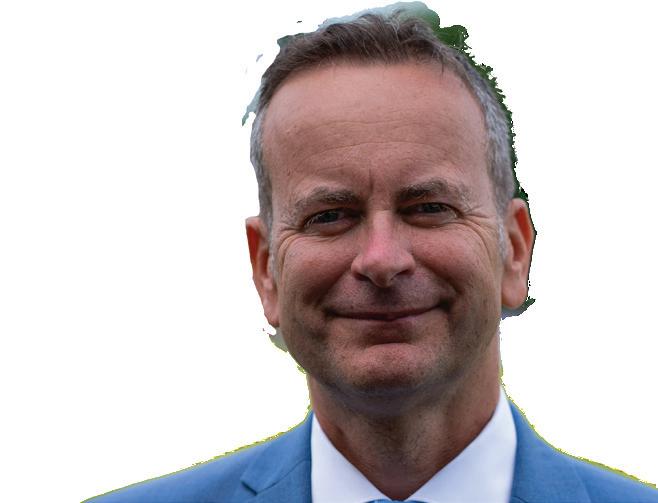

West Midlands Grand Rail Collaboration and Network Rail Supervisory Board - a partnership between those organisations responsible for the railway in the region and other key stakeholders with a vested interest in its success, I welcome better links between Birmingham and London. However, the prospect of the route terminating at Old Oak Common fills me with concern.
I have always been sceptical of ceding too much power to transport planners. Too often, their words are taken as gospel because they come across as untouchable academics, boffins who can spew out endless data and create a picture of paradisical bliss. They create spatial visions with words and illustrations showing great transport, together with tree-lined streets and enclaves of new affordable housing, continental-style coffee shops, boutique, upmarket shops and youth clubs for kids, so that they swap knives for table tennis. It’s a crime-free environment where everyone is happy, and GDP is enhanced like never before.
Public transport improvements do deliver regeneration, but they tend to gentrify locations, displacing social problems caused by exclusion and poverty, or concealing them on the fringes. Any walk around locations served by London Overground since its transformation post-2008 is instructive as to the impact, but there are other areas that haven’t fared as well since transport developments landed on their doorstep. Cash-strapped and crime-ridden Croydon hasn’t enjoyed the rejuvenation that the advent of trams might have heralded and the journey to recovery for parts of Kent close to HS1 has been slow.
For years, planners were obsessed with Stratford being the epicentre of a future for London, buoyed of course by a mix of Docklands, London Overground, HS1 and the Olympics. They forgot, though, that just enabling transport lines to converge, doesn’t necessarily mean that folk are happy with it as a destination. Take away football at West Ham and the Westfield shopping centre and Stratford hasn’t got as much going for it as the planners might have envisaged. Culture, atmosphere, heritage, a legacy of tourist attractions and bright lights take time to develop and become embedded in the psychology of people - decades, if not centuries, and for this reason, folk will probably, in our lifetime at least, want to
20 | 7 April 2023 www.passengertransport.co.uk COMMENT
Paradisical bliss: A visualisation of what Old Oak Common will look
be plunged straight into Euston from the Midlands and the North.
There’s a romance about arriving off a train straight into the maelstrom that is the beating heart of a great city - a shuttle service over the last few miles just doesn’t have the same vibe. Furthermore, one of the supposed benefits of HS2 was to alleviate congestion on existing routes, but this won’t do any favours for the existing Elizabeth Line, nor the West Midland Metro, which will transport customers from the new terminus in Birmingham’s Curzon Street into the city centre. The 29-minute anticipated journey time reduction between Birmingham and the heart of London will also shrink to a negligible level once shuffling between trains at both ends of the journey is considered.
Back to Old Oak Common and although the HS2 website makes play on the transformative impact that an HS2 station will have on the local community, I can only see this as marginal. Most folk, as with Stratford, will just be travelling through, making connections; does anyone genuinely believe that those living on the White City estate or deep in East Acton or Harlesden really will feel the benefit to their daily lives of a premium-priced railway that can take them to Birmingham? It’s a great place but is it somewhere they might not have the need or aspiration to visit more than a handful of times over a few years?
To put it politely, as a destination, it could take Old Oak Common several generations to become a place that folk genuinely wish to visit in its own right. Apart from Wormwood Scrubs and Queens Park Rangers F.C, there’s not a lot to draw outsiders right now - indeed, I’d argue the former is even more attractive than the latter! Once again, the problem is that these pesky planners’ eyes lit up when they saw in Old Oak Common, their textbook winning formula of ‘disused railway land + barren, open disused spaces + derelict industrial setting + outskirts of city + not too far from an airport + deprivation = fairy tale story of transformation. Of course, one might contest that this formula applied to Docklands, which has admittedly been transformed, albeit primarily as an economic workplace hub. However, the planners of the ‘70s and early ‘80s who were the architects of the Docklands regeneration, never envisaged Canning Town or Canary Wharf being the London terminus or even pivotal points on a new, expensive high-speed
line connecting the capital with a major city. It’s madness, it really is. Another ludicrous aspect of the whole Old Oak Common obsession is this neglect of those seeking to reach it from comparatively close-by locations to its north and south. Living, as I do, in Shepperton, to travel northwards seven miles to Heathrow and beyond to the Great Western Line or further beyond into Middlesex is next to impossible, and for this reason, almost all travel that requires crossing London, requires going into the heart of the capital. Unless there’s a direct railway line from Surrey and South West London to Old Oak Common, then I’ll always be travelling to Birmingham via Euston. Even West Midlands Trains with its stopping service, or from Marylebone on Chiltern seem more palatable than messing around in Old Oak Common. The same goes for folk living in Kent and other parts of the Home Counties. Looking at HS2 very objectively, it does make me uneasy when I consider sectors that appear to be in a worse situation than transport, where the money spent on this new railway could make a real difference. I recently spent some time undertaking a customer service review of a large hospital and was overwhelmed by the sheer endeavour of staff in adversity and genuinely emotionally moved by the financial constraints within which they function. So too, I utterly despair at the sheer challenges faced by us all these days in booking GP appointments and when I see the travails that the police face against a backdrop of rising crime and falling numbers of officers, I am filled with real concern, bordering on alarm. As for defence spending in the context of Ukraine and an increasingly volatile geo-political landscape…
If, as we are led to believe, HS2 is about levelling up Britain and helping cure regional as well as class inequalities, I wonder whether diverting spending towards saving bus routes from being decimated would have a greater impact for the masses and their everyday lives, rather than a smaller minority who might once in a while wish to make a quicker and more expensive trip from London to Birmingham, despite existing alternative services being very palatable and, post-pandemic, with more than sufficient available seats. It would have been tempting to save the money on elements of HS2 to fund cheaper fares for those living in deprived areas of the country, as a way of
combating the unstoppable path the railway is forging to become exclusively a means of travel for the rich.
If we are to keep investment in rail, then perhaps once and for all, addressing the bottleneck that is the approach to Birmingham New Street, or dealing with ageing and unreliable infrastructure on the busy freight and passenger route through Water Orton or improving reliability on freight routes circling Birmingham, would be better. Modernising stations and enhancing capacity further between Snow Hill, Moor Street and Banbury wouldn’t go amiss too. Or if there was loose change available beyond the West Midlands, then there are similar needy hitherto unsolved causes throughout the UK - the notoriously constrained Liverpool Street ‘throat’, flat-junctions across the South Eastern network, capacity issues between Surbiton and Waterloo and also on the Brighton mainline, as well as TransPennine congestion, ageing infrastructure per se which leads still to far too many temporary speed restrictions.
The list is endless and for every deserving cause in transport, there’s a ‘vanity project’ that conceptually gets planners and politicians aroused but beyond cosmetics, has little going for it - such as the East London cable car or the various ‘demand responsive’ bus schemes that have been trialled but haven’t been expanded because they are ultimately impractical and cost prohibitive.
I can get my head round HS2, even if I can just as easily see logic from detractors. What I cannot fathom is how the project was embarked upon and persisted with if there was ever any doubt that taking the route into central London was going to be possible. Even to embark on a major project with the prospect of Old Oak Common being a ‘temporary’ arrangement for 10 years seems nonsense. At least my pointless new route to Sadsea Bay is a bit of harmless fun. The folly that is Old Oak Common has the potential to be the most incompetent and patently stupid decision in the history of UK public transport.
ABOUT THE AUTHOR
Alex Warner has over 29 years’ experience in the transport sector, having held senior roles on a multi-modal basis across the sector
“[This] has the potential to be the most incompetent and patently stupid decision”
www.passengertransport.co.uk 7 April 2023 | 21
NICK RICHARDSON

Policy Statement is short on policy
The UK Government has published a draft on the future for national networks but it lacks meaningful substance in many areas
The Draft National Policy Statement (NPS) for National Networks, 100 pages or so that took two years to produce, is an update of a 2015 publication It is now the subject of consultation provided that you answer all the specific questions for which responses are invited by the Department for Transport. It covers road and rail and superficially claims to have adopted the principles of sustainability and environmental protection. One of 12 NPSs, this one aims to clarify the decision-making process for Development Consent Orders (DCOs). A DCO is the planning process for nationally significant infrastructure projects for which the Planning Inspectorate makes recommendations to government. As DCO applications tend to originate with government agencies, the process is supposed to be quicker than the parallel planning process determined by local planning authorities.
This all matters because all large road, rail, water and waste schemes are subject to the DCO process, although the definition is not as tight as it could be. A cynic would regard DCOs as a means of government overriding the local planning process to achieve what it wants as soon as possible. NPS has the status of guidance that should be followed when considering large schemes, forming part of the DCO process - it therefore influences the future for roads and railways. However, it isn’t a national transport strategy and applies in England only; Scotland and Wales have their own strategies but England does not.
Appraising sustainability
The NPS has been subject to an Appraisal of Sustainability, a separate document to examine, among other things, “reasonable alternatives to the NPS”. At this point, it seems fair to wonder if this is guidance for the sake of appearing to achieve something as it seems to have to justify its existence. The NPS itself states that the Appraisal of Sustainability “found no significant adverse effects of the policy set out in this NPS”; this is important because it is deployed to support the position presented throughout. Perhaps an alternative to the NPS and related documents is to produce clear guidance for the DCO process in the first place. In the tangle of terminology, the NPS considers that infrastructure is built for economic reasons while hoping that there is no detriment to environmental sustainability. The implication is that major road schemes need not be environmentally problematic, an extraordinary claim in the current context; it seems that greenhouse gas emissions and their negative contribution to Net Zero, induced traffic and congestion is not sufficient to reject major road schemes. Greenwash at its best.
If this NPS is required at all, then it should
be very clear about the relationship between road and rail rather than trying to appease any applicant that may wish to embark on the DCO process. It seems to support passenger rail services and says a lot about freight on trains but says far more about road capacity. If policies are set out elsewhere, then the NPS should simply be a pointer towards them, not adding another layer of guidance. Ironically, the DCO process is supposed to be simpler than previous requirements but this is being eroded bit by bit.
Perpetuating mistakes
Inconvenient truths are exacerbated with expressions such as “much of which has already been delivered or in progress” i.e. not achieving much to date. The old chestnut of tailpipe emissions reducing as a result of electric vehicles becoming commonplace emerges once again. However, of the scenarios tested, most showed a continuation of vehicle emissions by 2050 and we know that targets for the uptake of electric vehicles are far from being reached and any large scale shift is unlikely to happen for a variety of reasons.
In contrast to the non-committal terms scattered through the text, it appears that increased demand for road movements (mainly cars) will create problems that need to be overcome by increasing capacity, hereby conflicting with the national transport strategies for Wales and Scotland but not for England because there isn’t a strategy. Government continues to forecast growth in traffic then considers how to respond, a route adopted for decades even though it makes little sense. This can be achieved by simply overlooking the policy context in certain circumstances; “continued absolute traffic growth is likely under all scenarios, and therefore enhancements on the national road network will be necessary in order to ensure the national road network operates effectively in the face of growing demand”.
This gives the game away - predict and provide is still alive and kicking. From this we can see that all the progress made towards sustainable transport can be junked when convenient. Later on, the document talks about “moving away from transport planning based on predicting future demand to provide capacity” towards vision-led planning but undermines this in the next sentence by
COMMENT
22 | 7 April 2023 www.passengertransport.co.uk
“This gives the game away - predict and provide is still alive and kicking”
referring to “various challenges that will be presented by certain sites” that will require road improvements. In other words, if policy gets in the way then NPS provides a get-out clause; this is hardly progressive thinking nor does it provide clarity.
Rail boom, possibly
When it comes to railways, the NPS includes some brief commentary about “a vital part of the country’s transport infrastructure” and the need for further electrification although it isn’t clear how the NPS relates to the current processes for major rail schemes. There is a comment that “expansion to the network tends to increase overall demand” which is rather circumstantial but does mention bottlenecks and capacity constraints. There is also mention of reallocating network capacity to meet freight demands ‘alongside changing passenger demand’ which suggests that passenger options may become more limited along some routes.
Positive noises are made about the benefits of passenger rail investment with “improved and new rail links in less well-connected communities” without being specific: “The government will look to make appropriate improvements or additions to the rail network to improve capacity, connectivity, and reliability, including removing pinch points and blockages, upgrading existing infrastructure, reopening old alignments, adding new rail lines and stations to the network, or improving enabling assets such as maintenance facilities.”

There is a bold statement that “the government has, therefore, concluded that at a strategic level there is a compelling need for development of the national networks - both as individual networks and as a fully integrated system” but there is nothing about better managing demand or how rail can be weighed up against roads but rather more to support the case for improving the strategic road network. There seems to be nothing to take the integration concept any further, probably because it isn’t defined. However, some mentions acknowledge buses, coaches and rail but peculiarly limited to urban areas. There is also the claim that “Bus Back Better sets out measures enabling buses to be used by all thereby enhancing levels of accessibility” without mentioning that this will require significantly more spend and certainly more
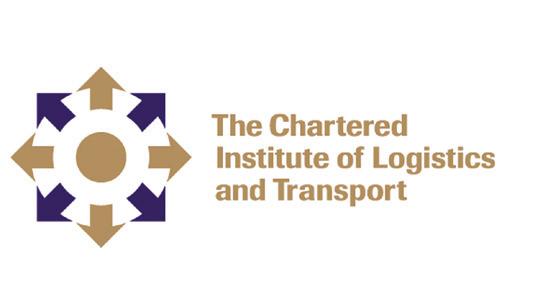
than has been made available so far.
On the bright side, reopening old railways and adding new lines looks promising providing that there is a positive business case and identified funding.
Environmental degradation

Regarding environmental protection, there is a clear statement that “ancient woodland, ancient wood pastures and parkland, and ancient and veteran trees are irreplaceable habitats” for which consent will not be given ‘unless there are wholly exceptional reasons (for example, where the public benefit would clearly outweigh the loss or deterioration of habitat)’. In other words, certain natural habitats are untouchable except when they are not. Defining ‘public benefit’ raises some debate because I would suggest that leaving designated sites alone should surely be in the public interest rather than wiping them out. Similarly, the presence of other important nature site designations and heritage assets also is not necessarily sufficient to refuse consent.
So we have a document that contradicts itself throughout and evens questions it own purpose. In doing so, it adds confusion not clarity to the subject and seems to have no overall objective other than making the DCO process even more clumsy and lacking in the clear strategic direction that it should be providing. It does nothing to help the cause of large passenger transport schemes because the general thrust, such as it is, can be overcome depending on the circumstances. All in all it’s pretty awful guidance from the government and hopefully the final version will be rather better and hopefully not take another two years to produce.
ABOUT THE AUTHOR
Nick Richardson is Technical Principal at transport consultancy Mott MacDonald, chair of CILT’s Bus and Coach Policy Group and a former chair of the Transport Planning Society. In addition, he has held a PCV licence for over 30 years.
IN ASSOCIATION WITH: www.ciltuk.org.uk
01536 740100 @ciltuk
Tel:
www.passengertransport.co.uk 7 April 2023 | 23
Positive noises are made about rail investment, including reopening lines like the Dartmoor Line
Solar has a future that is very… bright!
It goes without saying that the crisis in Ukraine has stimulated significant interest and activity across all energy sectors. In the short-term, demand for non-Russian oil and gas has, of course, boomed, but policy makers and investors continue to turn their attentions to renewable energy. Solar and wind power currently supply around 5% of the world’s energy needs, with this figure being expected to increase to 25% by 2035 and possibly to 50% by 2050. Next month our report will focus on wind, but before that, we will turn our attentions to solar power. How does it work?
How efficient is it? How sustainable and, most importantly for consumers, how cheap?
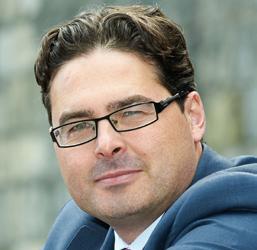
Harnessing solar energy relies on photovoltaic (PV) cell panels that are mounted on rectangular frames and linked together to form a photovoltaic system (often colloquially referred to as a “solar array”). In simple terms, sunlight is absorbed by the panels before generating electron “excitation”, which when diffused through the panel’s silicon film, generates an electrical current. As the output of a solar panel is Direct Current (DC), inverters are required for conversion to the Alternating Current (AC) used in grid transmission. Over 90% of PV solar panels use high-purity silicon and converting sand into solar cells is a highcost, high chemical and highly energy-intensive process. Silica rich rock formations first have
to be pulverised into smaller fragments, which are then treated with an array of chemicalsmany of which (gallium, arsenide, hydrochloric acid, hydrogen fluoride, acetone) are toxic. The resultant “sponge” is then melted at extreme high temperatures (arc furnace process) to form cylindrical silicon ingots. The ingots are then sliced into thin disks called wafers, which are intricately soldered together with plastic piping and copper conductivity rods to make up the main components of a panel. Reading all of that, it would be reasonable to ask how green this product is? After all, significant amounts of fossil fuel energy are required in the manufacturing process. A precise answer to the “environmental payback” question is predictably difficult because so much depends on how the raw materials are extracted and what type of energy (coal or gas) is used in the arc furnace. Our best estimate is that one solar panel consumes the equivalent of 250-300 kilowatt hours (kWh) of electrical energy in the production process, in return for an annual generation of 100kWh. This gives a “green payback” of around 2-3 years, which on a 25-30 year lifespan is a very impressive figure. What about solar energy on a commercial level? Here too the calculations are notoriously
complex, as they again depend on the same factors of raw material and processing. Plus we have the Byzantine complexity of electricity pricing, which makes clear-cut conclusions difficult. In 2022, the returns for solar power (along with all renewable generation) were enormous, because consumer prices were based on the stratospheric cost of gas. But this has not always been the case, such that the fixed renewable tariff applied by UK power generators (to cover the capital costs of renewable projects) have made solar (and wind) power the most expensive form of generation over the last 10 years. It remains the case though, that as the original capital investment depreciates over time, related power generation from those assets will become cheaper every year until there is no cost at all. Because…well, sunlight is free!
Emission free, zero cost generation and still much cheaper than wind turbines to manufacture, it would seem foolish to bet against the inextricable rise of solar power. Certainly Joe Biden seems to think so in his “new green deal”, where there is a commitment to build 500 million solar panels in the USA over the next 10 years. The general public also seems to feel fairly positive about solar power. In a 2022 survey, 70% of the UK population was broadly favourable towards solar.
Despite all this, global investment in solar power lags behind both wind energy and the enormous amounts of money currently going into roadside electrical charging. There also remains the thorny issue of China’s predictable domination of the sector, with 70% of the world’s solar modules being manufactured in that country. And whilst China’s dominance of the solar industry has benefitted consumers, this is largely a result of anti-competitive practices that have manipulated the price of solar panels down by 85% since 2010.
Expect that particular problem to run for a while, because energy generation normally comes under the umbrella of “strategic importance”. Western governments might even seek to hamper solar capacity, if it was to result in over-reliance on Chinese production. But it is difficult to see a world where solar power does not play a huge part in our energy solutions going forward. With a modest initial carbon and capital footprint, followed by years of minimal cost operations, solar surely has a future that is very…bright!!
Despite the hurdles, it’s difficult to see a world where solar power does not play a huge part in our energy solutions going forward
James Spencer Portland
COMMENT WANT TO KNOW MORE? Visit Portland’s fuel forum page: portland-analytics.co.uk/fuel-forum 24 | 7 April 2023 www.passengertransport.co.uk
“70% of the UK population was broadly favourable towards solar”
ENERGY MARKET REPORT PORTLAND FUEL ANALYTICS - APRIL 2023
GREAT MINSTER GRUMBLES

Don’t blame us for stalling bus progress
It was no surprise that the Transport Select Committee’s report on its inquiry into the National Bus Strategy, published on March 30, was critical of this department and our overall performance when set against the objectives and aspirations of the strategy. Perhaps what was surprising was the relatively moderate, almost polite, language used by the committee when you consider how far short of the strategy’s ambitions we have fallen.
Inevitably the committee haspin pointed the shortage of funding as one of the main issues, but we can hardly be blamed for that if colleagues in the Treasury fail to give us the funding that we all know is required if service levels are to be maintained, let alone increased. Perhaps that, in part, explains why the committee was reasonably gentle in its criticisms of our performance.
But that aside, the report still makes uncomfortable reading and has highlighted where we have unquestionably failed to deliver. It’s reminded us that we have yet to announce a date for ending the sale of non-zero-emission buses despite initiating a consultation on this over two years ago. It’s really a bit beyond me why it is taking so long to make an announcement on this. The longer we delay, the harder it will be to get a fully zero-emission fleet on the road by 2050.
The committee has also reminded us of the commitments in the bus strategy to provide new guidance on socially and economically necessary services and that we would consider
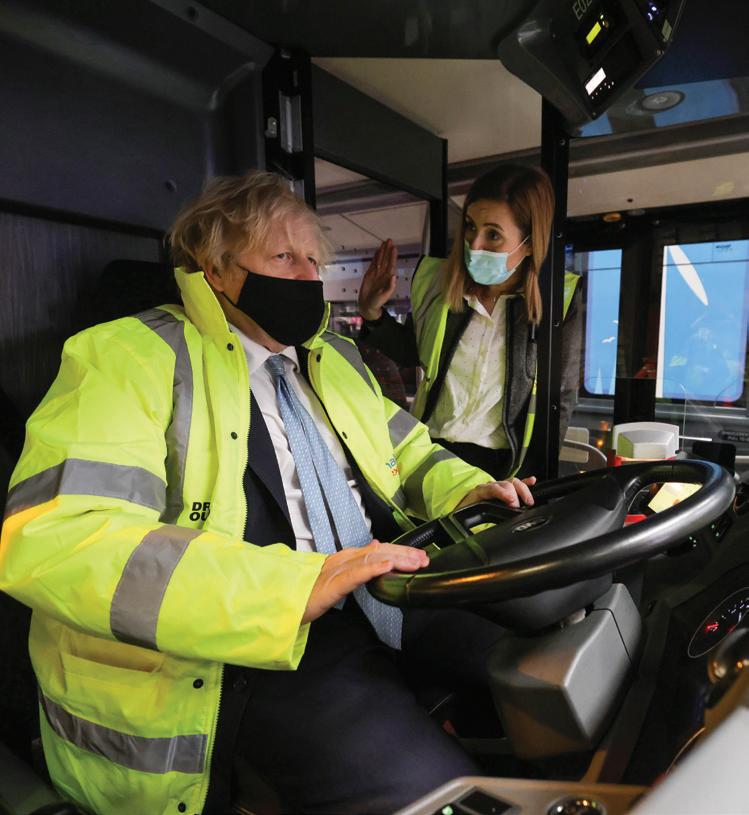
introducing a statutory requirement on local authorities to provide them, that we would look again at the ban on new municipal bus companies, and also issue updated guidance to support areas considering franchising. In the two years since the bus strategy was published none of this has happened.
It’s going to be interesting to see how we respond to the report, as there is no getting away from the fact that, for whatever reason, we have not delivered on the aspirations of the bus strategy. It may have been written and published at a time when Boris Johnson was in No 10 and Andrew Gilligan was his transport adviser - and we all know that Boris has a huge affection for buses. Barely a speech went by without Boris making some kind of reference
to the bus. And the committee’s report has, somewhat laboriously, reminded us of the significant commitments that were made on bus funding even before the strategy itself was published. This has all come back to bite us.
How we get out of this mess is going to be fascinating to watch. There can be no doubt that a long-term funding solution is required, and that substantially more funding needs to be provided than is currently the case if we are to maintain or grow bus service levels. As the committee has so rightly pointed out, “it would be absurd for the government to spend billions of pounds to support the ailing bus sector through the pandemic and then allow it to wither away”. Indeed it would, although I would be tempted to use stronger language than “absurd”. It would actually be a scandalous waste of taxpayers’ money, even if there was a clear need to support the industry through the pandemic.
But I would say this to the industry: don’t blame us here in Great Minster House if the necessary funding is not forthcoming. Look the Treasury, and perhaps No 10, squarely in the eye and ask why they are not willing to provide the support that is needed.
Meanwhile, we continue to splash the cash on HS2. I commented in my last column that I could not understand how delaying the construction of the West Midlands to Crewe section of the project by two years would save money. I’m pleased to see that the National Audit Office, in a report published on March 27, agrees with me, so I’m in good company! It has said that “the deferral of spending to manage inflationary pressures will lead to additional costs and potentially a more expensive project overall”.
There could be no starker contrast between our approach to bus funding and our approach to HS2. While we happily carry on splashing the cash on a project such as HS2 - notwithstanding doubtless herculean efforts to control costs - we keep the bus industry on a very tight leash. It doesn’t make a great deal of sense to me!
Anyway, we now enter a short period of purdah as we approach the local elections on May 4. I don’t normally take much of an interest in local elections, but these ones could be particularly interesting. If the Conservatives get crushed I wonder what the political response from No 10 and the Treasury will be. Watch this space!
COMMENT
Our Whitehall insider imagines what’s going on inside the minds of the mandarins at Great Minster House, home of the DfT
“How we get out of this mess is going to be fascinating to watch”
www.passengertransport.co.uk 7 April 2023 | 25
Boris Johnson launched the bus strategy two years ago
NEW TC FOR WEST MIDLANDS NAMED
Miles Dorrington, acting traffic commissioner for the West Midlands since the retirement of Nick Denton in last June, has been named as the permanent replacement.
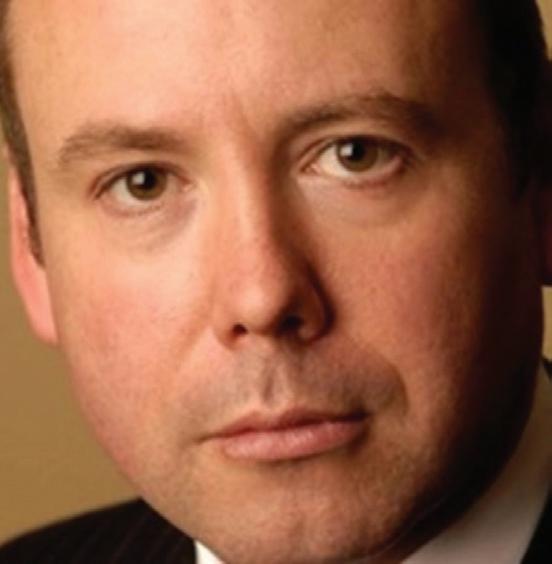
“I am delighted that Miles has been appointed as a permanent member to the traffic commissioner team,” said Richard Turfitt, the senior traffic commissioner. “He brings with him significant experience of this jurisdiction from many years as a deputy traffic commissioner.”
In addition, the transport secretary Mark Harper has appointed two new deputy traffic commissioners. They are Catherine Moxon and Dr Paul Stookes. They will be deployed on the North of England and South East of England respectively.
Moxon is a barrister with
experience in both criminal and civil practice. She now specialises in regulatory law. She sits in the medical practitioners tribunal service and chairs the school admission and school exclusion panels. Stookes is a solicitor-advocate with over 25 years’ experience in public, civil and criminal law.He is also an advisor to the UK Environmental Law Association, and a lead assessor for the Institute of Environmental Management and Assessment membership scheme.
APPOINTMENTS
SCOTTISH GOVERNMENT
Kevin Stewart has been appointed as the Scottish Government minister for transport by the new Scottish first minister
Humza Yousaf
Stewart (pictured), the MSP for Aberdeen Central since 2011, previously served as minister for mental wellbeing and social care; and minister for local government, housing and planning. He was also a City of Aberdeen Councillor from 1999 to 2011. As a councillor, Stewart chaired the North East of Scotland’s Regional Transport Partnership, NESTRANS.

He succeeds Jenny Gilruth, the MSP for Mid Fife and Glenrothes, who has moved as part of Yousaf’s reshuffle to the post of cabinet secretary for education and skills after 14 months holding the transport brief.
ABELLIO LONDON
ADD YOUR JOBS HERE
To advertise, call now 020 3950 8000 or email the team at sales@passengertransport.co.uk
Bus operator Abellio London has announced the appointment of Adam Shellard-Dedman as head of operations.


Shellard-Dedman, has moved into this new role at Abellio as the business continues to grow its pioneering electric infrastructure and fleet. He will manage teams based across Abellio’s six London garages which operate 800 buses across 53 routes with 2,500 employees. Shellard-Dedman will report to Lorna Murphy, Abellio London’s operations director.
Shellard-Dedman spent 16 years in the police and he previously held the position of operational safety manager at Abellio. He returns after a spell with autonomous vehicle firm Wayve.
STAGECOACH SOUTH WALES
Stagecoach has announced the appointment of Martin Gibbon as managing director of its bus operation in South Wales.
Gibbon (pictured), who is currently operations director at Stagecoach West, joined the group in 2011 as a graduate trainee, initially spending his time in South Wales. He also previously held senior operational roles in West Scotland, South and South West.
He will succeed Nigel Winter, who has led the business for the past eight years, and confirmed earlier this year his plans to step down. Gibbon will will take over as managing director of Stagecoach South Wales in May.
HS1
HS1 Ltd – the owner and operator of the High Speed 1 rail route, has announced the appointment of Mattias Bjornfors as the company’s first-ever strategy and regulation director.

Bjornfors (pictured), a regulatory affairs expert with over 18 years of experience, will help the company navigate upcoming key regulatory events and challenges, including the creation of Great British Railways.
Prior to joining HS1 Ltd, Bjornfors spent more than a decade at Gatwick Airport, most recently as head of economics and regulation where he was responsible for regulation of the airport following the breakup of BAA.
He also held roles in the energy sector and previously worked at the Department of Trade and Industry.
Miles Dorrington named as Nick Denton successor
26 | 7 April 2023 www.passengertransport.co.uk CALL NOW TO ADVERTISE 020 3950 8000 or email sales@passengertransport.co.uk
Miles Dorrington
CAREERS

DIVERSIONS
Houchen takes aim at TfN board members
Tees Valley mayor labels body a ‘talking shop’
“Tees Valley mayor Ben Houchen has launched a scathing attack on a regional transport body after records show he has attended no meetings in almost five years despite being a board member,” reported The Northern Echo. It seems the verbose mayor, who is the only Conservative mayor on the board of Transport for the North and who is alleged to like a biscuit or two in a meeting, hasn’t attended a single one of the 22
TfN board meetings. He has labelled the transport body a “talking shop” and said he continues to deliver for his area, unlike fellow board members who “sit around tables for long periods of time saying what
should be done and congratulate themselves for their efforts”.
Houchen’s comments drew a withering response from Jamie Driscoll, the Labour mayor for the North of Tyne.
“I think the people I represent have done pretty well out of my participation in TfN – although I’ve never had a buffet lunch there,” said Driscoll. “They don’t even serve biscuits – which Ben would know if he ever turned up.

“Sitting round the table is how we’ve landed the country’s best devolution deal – despite me being a Labour mayor negotiating with a Conservative government...”
Ouch!
NEXT STOP BLACK (BIRD) FRIARS?
Substantial rebranding?
SUPER FUN IN THE HOUSE OF LORDS
The issue of buses made a rare appearance in the House of Lords at the end of last month and you can read our report on the debate elsewhere is this edition.
SUBSCRIPTION ORDER FORM
Amidst some very topical debate, Conservative peer Lord Moylan asked transport minister Baroness Vere if the government would be issuing guidance to plumbers and electricians on how to carry their tools and equipment by bus as London mayor Sadiq Khan’s expansion of the Ultra Low Emission Zone “would deprive them of their vans”.
“Questions is fun today, isn’t it?” responded Vere, confirming there would be no guidance. However, she once again demonstrated she has an issue with anything bus-
related that is prefixed with the word ‘super’ - as buses minister Vere always seemed to have an issue with the government’s plans for ‘Superbus’ networks.
“I would also point out that he [the mayor] announced something called the Superloop for outer London, which sounded very new,” she said. “However, I checked and in my area that includes the existing X26, so the Superloop involves quite a substantial amount of rebranding... as often happens with the mayor of London.”

Govia Thameslink Railway last week opened a new station, and it’s the smallest one on its network. Introduced as part of a ‘living art installation’ by multimedia artist Alice McCabe, the display at London Blackfriars aims to frame the impressive view of London from Blackfriars and also includes a special model railway station that acts as a ‘bug hotel’ for passing insects.
Commenting on the installation, Jason Brooker, GTR’s environment head honcho, said: “We hope the new bug station at Blackfriars will encourage people to get creative in their own gardens and outside spaces!”

SEEN SOMETHING QUIRKY?
Why not drop us a line at editorial@passengertransport.co.uk
All annual subscription rates include delivery by secondclass post, or airmail for overseas. Please note: At present we are unable to provide printed subscriptions to readers based in European Union member countries. ANNUA L SUBSCRIPTION R ATES 1 year UK: £140 Rest of World: £280 2 year UK: £250 3 year UK: £375 WWW.PASSENGERTRANSPORT.CO.UK N A M E JOB TITLE CO M PANY ADDRESS POSTCODE TEL E M AIL DATE PLEASE START MY SUBSCRIPTION TO PASSENGER TRANSPORT CARD NU M BER SECURITY CODE EXPIRY DATE SIGNATURE I enclose a cheque for £ made payable to Passenger Transport Publishing Limited Please invoice my company (official order enclosed) I authorise you to debit my M astercard/VISA/ M aestro/VISA Electron card. Amount £ PT286 Email: subs@passengertransport.co.uk Return to: Subscriptions, Passenger Transport Publishing Ltd, PO Box 5496, Westbury BA13 9BX
‘Can I pay with contactless?’
Sadly absent at TfN board meetings...
28 | 7 April 2023 www.passengertransport.co.uk



































